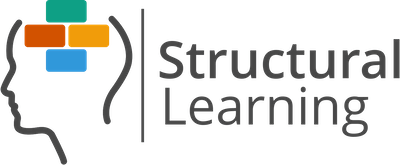

ATL Skills: A teacher's guide
Dr nancy macharia.
March 22, 2022
How can the IB's approaches to teaching and learning skills be successfully embedded in your classroom?
Nancy Macharia, D (2022, March 22). ATL Skills: A teacher's guide. Retrieved from https://www.structural-learning.com/post/atl-skills-a-teachers-guide
What are the Approaches to Learning Skills?
The International Baccaulearette (IB) has four programs namely; Primary Year Program (PYP), Middle Year Program (MYP), Diploma Program (DP), and Career Path (CP). Approaches to Learning Skills (ATLS) are an integral part of the International Baccaulearette Programme. The ATLS skills are designed to enable students in the IB programme to “ learn how to learn .” They are intended to be applied across curriculum requirements as well as provide a common language for teachers and learners to use when reflecting throughout the learning process.
There are five categories of ATL skills. In recent years, the spotlight has moved away from the development of generic skills and this has been thoroughly embraced in this approach to learning. By embracing effective learning strategies , student success can involve both the development of individual skills and subject-specific knowledge . Becoming an effective learner involves understanding some important principles of how to learn and the idea of adopting the ATL skills framework means that schools can focus on a holistic approach to classroom instruction.
The ATL Skills are presented in five broad skill categories:
Thinking skills
- Communication skills .
- Social skills
- Self-managemen t skills
- Research skills
This article focuses on the Primary Years Program (PYP) . The five ATLS are further broken down into sub-skills so that they are intentionally selected to align with the learning goals . For example, research skills have two main subskills which are information literacy and media literacy . In this article, I will unpack the five categories of ATLS and explain how they can be used in transdisciplinary learning alongside the Learner Profile in an inquiry-based learning environment. The learner Profile is an important element of the IB curriculum as it is attributes, that can assist students to become responsible members that can connect with local, national and global communities (IB, 2018).
How are ATLS taught?
Approaches to Learning Skills are transferable across different disciplines. For example, when students are taught the key tenets of research such as identifying the relevant information using skimming and scanning through the text or identifying keywords , students could use the same strategy in a social studies lesson as well as during a literacy session when they are reading a non-fiction text. ATLS should therefore be explicitly taught by modelling how they “ should look like ”.
It is vital that teachers and students collaborate to create a success criterion as this teaching and learning practice assists students to visualize what the ATLS looks like. When students understand what is expected from them, they are able to monitor their learning and to know when they have demonstrated the skills. Students understanding of ATLS is developed incrementally through practice.

Connection Between ATLS and Transdisciplinary Learning
ATLS can be used across various disciplines as they enhance transdisciplinarity. Teachers should therefore be intentional by identifying the ATLS that best aligns with the purpose of the unit. Learning engagements should be planned that are targeting the selected ATLS. An analogy that best describes the ATLS is a wheel as all the spokes are revolving and connected at the center. Transdisciplinary learning is at the center and all the ATLS should be connected and supported by the learning .

Skill-based questions to enhance student responsibility
Questioning is an integral part of the Primary Years Program as students are encouraged to be inquirers . While planning units of inquiry, teachers should consider identifying questions that enable students to reflect on the skills that connect to the concepts that they are inquiring into. For example, when teachers ask “how” questions, students are inclined to gravitate towards a skill-related response. For example, how did you find out information about children’s rights?
A student may respond by sharing that they interviewed a member of the learning community. According to Kaye (2014), students should be encouraged to research using Media, interviews, surveys, or observations (MISO) depending on the scope of their inquiry. Student engagement can also be enhanced using higher-order questioning. With the right sort of questioning, students' collaboration skills and communication skills can both be addressed.
Creating an activity with students that uses an inquiry approach often brings with it ample opportunities to practice strategies that lead to greater student responsibility. Coaching students to identify when they are utilising personal learning strategies such as communication skills or critical literary skills will help to build a common whole-school approach to nurturing inquisitive learners who can think for themselves.
How ATL research skills can be developed throughout a unit of inquiry
Fourth-grade students were inquiring about children’s rights worldwide. The teachers identified research skills as a tool that would provide students with a lens on factors that impact children’s rights worldwide. Using various forms of research such as listening to current news, reading non-fiction texts that highlight various local and global issues, students were able to identify a topic that they would research further, and ultimately take action. After reflection , students were able to make connections about how different factors that affect childrens’ rights are inter-connected . These connected skills taught through explicit teaching strategies in relevant activities help children adopt the ATL Skills in purposeful ways.
Communication Skills
Communication skills are concerned with how one expresses themselves confidently and creatively in diverse ways. Students are encouraged to collaborate and share their ideas using different learning modalities. Communication skills are grouped into sub-categories such as:
- Exchanging information, listening, interpreting, and listening.
- Literacy, reading, writing, and using language to gather and communicate information
- ICT- communication using to gather, investigate and share information
For example, during class engagements, teachers should aim and create opportunities for students to share their learning with other learners and reflect. Whilst enforcing communication skills, teachers would also assist students to connect with the learner profile of communicators which focuses on students ability to express themselves confidently and creatively using various learning modalities . The emphasis should therefore be on listening carefully to the perspectives of other students. In order for students to see the connection between the ATLS and Learner Profile, teachers may consider using Guy Claxton’s (2010) split-screen which assists students to understand what they are going to learn and how they will learn the concept ;
- what we are going to learn (knowledge),
- how we will learn (skills),
- what we are becoming/ will become during and after the learning ( disposition ie Learner Profile)

Teachers should be intentional about teaching objectives that enforce thinking skills. The lessons should be planned in a way that encourages students to become more skilful in their thinking . Thinking strategies such visible thinking routines assist students to focus their attention on certain concepts and ultimately develop high order thinking skills. In the classroom, making thinking more explicit would provide students with opportunities to think more clearly.
A consideration or adjustment is for teachers to create learning engagements that allows students to reflect on their thinking process using skilful crafted thinking skills- related questions . An example of a practice that may support students thinking is ongoing reflective journaling where students can document their learning throughout the unit. Teachers can connect thinking skills to the Learner profile of thinker by using the attributes through the unit. Students demonstrate the Learner Profile of thinker when they use critical and creative thinking skills in various contexts to explore complex problems and to take action. Students show initiative in making decisions that are ethical.

Self-management skills
Self-management refers to the ability for students to manage their behaviors, thoughts, and emotions in a manner that supports the progression of learning productive way. This has been a skill that has been brought to the fore during Covid-19 period where students have had to work independently when schools transitioned to Distance Learning . Self-management like all other ATLS require time to develop and they look different depending on the age and context.
Students demonstrate that they have acquired self-mangement skills when they can plan learning strategies and take action to achieve their goals. The goals should be realistic and achievable but teachers may be required to scaffold the process. A checklist may be a useful strategy for students to use as they develop their independence and ultimately mastery .
Social Skills
Social skills are concerned with students cooperating and accepting responsibility as they work with other students . Students are expected to respect others, resolving any conflict that may arise and to be involved in group-decision making as they adopting a variety of group roles during the learning and sharing process. Depending on the focus of the unit, the teacher may assist students to make connection with the Learner profile attribute of principled.
Students demonstrate the Learner Profile of principled when they interact with others with integrity and honesty. The teacher may set up learning experiences where students work in pairs or in groups so that students can collaborate and while doing so be able to have a sense of fairness and respect other students perspectives. The set up can take the form of games or discussions. For example students can watch a video together and then discuss its content.

How do the ATL Skills Foster Lifelong Learning and Growth?
As educators, our primary focus for teaching should be fostering the interrelated skills of the ATL framework. The ability to communicate effectively, think flexibly, and work collaboratively are just a few examples of the essential skills we aim to cultivate in our students.
To do so, we must incorporate the language of the learner by providing student-facing language, so they can grasp the fundamental concepts we are teaching. Debating and discussion questions allow students to apply and connect concepts to their personal lives, while key questions framed through the lens of inquiry-based learning help build towards a deeper conceptual understanding.
Incorporating the interdisciplinary nature of the skill-cluster approach to teaching can lead to exciting ideas for skill-based activities that encourage growth through meaningful assessment. The development and application of these interrelated skills not only prepares students for academic success but also enhances their ability to think critically and work collaboratively in various social situations.
They form the foundation for lifelong learning, where growth is a continuous, iterative process of reflection, self-improvement and consistent practice.
Final Thoughts on the ATL Skills
In conclusion, by incorporating the ATLS and Learner Profile in instruction, students are provided an opportunity to use their skills and to develop the desired attributes . It is worth considering using the ATLS and Learner Profile in the reflection process each day. For example;
“How did you use your research skills?”
“When did you use self-management skills today?
“ What skills did we use today?
Student success encompasses more than just passing exams , providing a focus of approaches to 'how we learn will provide students of all ages with the effective learning strategies they need to be successful lifelong learners. Providing children with opportunities to practice strategies is as much a part of the education experience and passing SATs. Developing stronger, more self-regulated learners doesn't mean reinventing the wheel. Embracing the ATL skills clusters sits side by side with your subject content. If anything, promoting skills development using deliberate strategies will help the next generation take on the complex challenges that life throws at them.
Nancy Macharia is an experienced IB Educator and Primary Years Curriculum Coordinator at an IB school. She is an instructional designer and is passionate about developing students’ Service and Action learning capabilities. She can be contacted using this email address: [email protected]

Enhance Learner Outcomes Across Your School
Download an Overview of our Support and Resources
We'll send it over now.
Please fill in the details so we can send over the resources.
What type of school are you?
We'll get you the right resource
Is your school involved in any staff development projects?
Are your colleagues running any research projects or courses?
Do you have any immediate school priorities?
Please check the ones that apply.

Download your resource
Thanks for taking the time to complete this form, submit the form to get the tool.
Discover the freshest content on the Inspiring Inquiry website today! Check out the "What's New" page.
A TL Resourcrs
Back to Approaches To Learning (ATL)
WEF Education 4.0 Taxonomy & IB ATL
Approaches to Learning Place Mat
Podcast: Interview Sonya Terborg About the Approaches to Learning (ATLs)
Angeline Aow interviews Sonya Terborg about the Approaches to Learning (ATLs). Sonya has been a PYP educator since 2003 when she began working with 2nd Grade students at Bonn International School and has since worked as an art teacher, homeroom teacher, and technology integrator. Sonya is currently teaching MYP Design at Nanjing International School. Sonya is a PYP workshop leader and has worked with the IB on developing the PYP Blog and on several projects in relation to the PYP Enhancements. Her interest lies in challenging ideas and seeking understanding in how we can best “do school”. To find out more about Sonya and her work, you can follow her on Twitter or check out her website .
PYP Early Years ATL Learning Card Example
Five Ways to Deepen Student Comprehension
ATL Thinking Sub-Skills Check List
Importance of Teaching Empathy as an ATL
Prior to the Enhanced PYP empathy was an "PYP Attitude" attribute. In the Enhanced PYP, it has been subsumed into the Learner Profile under "Caring". Since empathy needs to be explicitly taught, I encourage PYP teachers to consider teaching empathy as an ATL skill under "Social Skills" (as it is in the MYP). Learn more about the importance of teaching Empathy.
Developing and Implementing High-Quality Success Criteria
The Importance of Differentiating Instruction & Assessment
It is critical to incorporate differentiation and assessment strategies during collaborative planning and teaching for implicit and explicit opportunities for all students to develop ATL skills both inside and outside the programme of inquiry. Learn more about Differentiating Instruction and Assessment.
What Is The 3-2-1 Strategy And How Can It Be Used For Critical Thinking?
What’s the 3-2-1 strategy? The 3-2-1 strategy is simply a format that can frame–well, really anything. Great for stimulating critical thinking and ATL understanding.
Examples Of The 3-2-1 Strategy
It doesn’t even have to be about about teaching and learning. You might ask someone to name…
3 of your favourite genres of music, 2 of your favourite songs, and 1 pattern you noticed making that list of genres and songs
3 cities you’ve visited, 2 of your favourite memories of those 3 cities, and 1 place you’d like to go next
3 causes of pollution, 2 solutions that could help address those causes, and 1 thing a person can do every day to help immediately/have an immediate effect
3-2-1 is a tried-and-true way to frame anything from a pair-share or journal entry (e.g., ask students to write 3 things they think they know, 2 things they know they don’t know, and one thing they’re certain of about a topic) pre-assessment to a post-assessment (e.g., list three ways your project or learned skill reflected mastery of skill X, two ways skill Y still needs improving, and one way you can make your presentation stronger in the next five minutes) to a reflection of the post-assessment.”
The most common use of 3-2-1 is in response to a reading or lesson–usually 3 things you learned, 2 things that made you curious or confused, and 1 most important thing you learned or should do with what you’ve learned.
Using The 3-2-1 Learning Strategy For Critical Thinking
Note that these are just rough examples of using the 3-2-1 for learning. Feel free to take any of these and improve them or create your own based on an idea you get reading them.
Also note, the use of vague or imprecise words like ‘thing’ and ‘name’ and ‘could have’ and ‘might have.’ This is done to make it general enough to be plainly useful to a range of grade levels of content areas. The ‘thing’ can be anything from fractions or the water cycle to a discussion about Shakespearean sonnets.
Analytical/Conceptual
3 differences between metaphors and symbolism, 2 things they have in common, and 1 general effect on a text that they each have
3 underlying assumptions of democracy, 2 common misunderstandings of democracy, 1 reason democracies have endured as a form of modern government
You could also have asked students to name 3 strengths of democracy, 2 forms of democracy, and 1 way it might have to evolve to maintain relevance in a changing world (misinformation, deep fakes, propaganda, partisanship, etc.)
Write 3 questions at the recall or understanding level, 2 questions at the ‘apply’ level, and 1 question at the evaluate level
Discussion/Listening/Debate
3 ways you agree, 2 ways you disagree, and 1 thing you learned (or that surprised you) during your conversation
3 things they said, 2 points they made, 1 thing you’d like to know more about
Metacognitive
3 things I know (generally) about mindset, 2 examples of the effect of mindset (generally), 1 thing I’ve noticed about my mindset today/before or during this lesson/recently, etc. (specifically)
3 ways my thinking occurs easily or naturally for me, 2 ways my thinking requires focus or effort on my part, 1 adjustment I can make in response
3 things I remember thinking during the lesson, 2 things I remember doing during the lesson, and 1 thing I could’ve done but didn’t
Spend 3 minutes summarizing, 2 minutes clarifying, and 1 minute writing one sentence that concisely summarizes the ‘thing’
3 things I could do with what I’ve learned, 2 things that other people do with this kind of knowledge or skill, 1 thing I am going to do with what I’ve learned
3 similarities, 2 differences, 1 question-to-guide-future-learning
3 things I learned, 2 things that were a bit confusing, 1 ‘big idea’ that sums up the relevance of it all
3 open-ended questions, 2 closed questions, 1 deepening question
3 clarifying questions, 2 probing questions, 1 contextualizing question
Reading Response Prompt Examples
Non-fiction text/simple: Name 3 things you remember or learned from the reading, 2 things that made you confused or surprised, and 1 thing you’d like to learn more about
Non-fiction text/less simple: Name 3 examples of text structure, analyze 2 ways that structure affected its meaning, and name 1 claim that the text seemed to make that was or was not well-supported
Fiction: Describe 3 ways the author developed the protagonist over the course of the book, describe 2 ways that development affected the plot’s development, and identify and explain 1 change the author could’ve made in that development and how that change would have affected the meaning of the text/your enjoyment of the text, etc.
Using 3-2-1 To Guide Inquiry Examples
Identify 3 places your inquiry could ‘start,’ identify 2 pros and cons of each, then create 1 driving question to guide your inquiry
Write 1 question, 2 answers, and 3 follow-up questions
Write 1 question, 2 revisions of the question, and 3 effects of those revisions
Write 3 questions, 2 possible answers each, and 1 implicit idea in either
2 sources for every (1) claim
3 sources, 2 media forms, 1 recent study
3 sources published within the last 5 years, 2 sources published between 5 and 20 years ago, 1 source published 20+ years ago
Lesson Planning
What are three ways I have designed with enough flexibility to meet the needs of a range of learners? What are two questions or challenges I anticipate? If they can only learn one thing from this lesson, what do I want it to be (ideally in one sentence)?
Curriculum Planning
What are three most important ‘big ideas’ in this curriculum? (Obviously, this could be any number–six, ten, etc.) How can they unify the ‘less important’ or less broad ideas? What are curriculum planning strategies I can use to promote enduring understanding (or critical thinking, transfer, etc.)? What is one change I can make to this curriculum to make it more flexible for all learners?
Characteristics of Critical Thinking Classroom
Critical Thinking Strategy for Note-Taking
OECD Future of Education and Skills 2030 Project
The OECD Learning Compass 2030 , a product of the Organization for Economic Cooperation and Development (OECD) Future of Education and Skills 2030 project, is an evolving learning framework that sets out an aspirational vision for the future of education with a focus on individual and collective well-being. The compass framework connects well to IB PYP standards and practices through its offering of a broad vision of the types of competencies students will need to thrive in 2030 and beyond.
These include core foundations , knowledge , skills , attitudes and values , transformative competencies , well-being and a cycle of anticipation, action and reflection (AAR) . The concept of learner agency and co-agency are also central to the Learning Compass.
For example, The OECD Learning Compass 2030 distinguishes between three different types of skills : cognitive and metacognitive skills which include critical thinking, creative thinking, learning-to-learn and self-regulation (PYP ATL Thinking & Research Skills); social and emotional skills – which include empathy, self-efficacy, responsibility and collaboration and the ability to communicate, (PYP ATL Social & Communication Skills); and physical and practical (PYP ATL Self-Management Skills) –which include using new information and communication technology devices, daily manual tasks, such as feeding and clothing oneself, but also with the arts.
Helpful L inks
Publications
About the project
OECD Learning Compass 2030 concept notes
International Curriculum Analysis
The Future We Want videos
Trends in Education videos
FAQ about the OECD Learning Compass 2030
The Future of Jobs Report 2020
The Sciences of Teaching
Download Resources
Back to Top
Top Nav Breadcrumb
- Ask a question

Approaches to learning: supporting research skills among learners through the language of instruction
This article talks about the insights gathered (through a Visible Thinking Routine) from Grade 2 – 5 English learners when they expressed the ir struggles conducting research in their homeroom .
T hese reflec tions unearthed how language can be a barrier and how teachers can collaboratively play a role in bridging these gaps for learner s , for them to overcome these challenges with simple research strategies .

By Lamiya Bharmal
“ I was curious to know if teachers’ thinking is visible to students and if students’ thinking is visible to teachers and this was the catalyst for my research. “
The PYP Approaches to l earning, focuses on skills that students can develop to help them “learn how to learn”. One of the skills is Research skills and this connects with the subject I teach – Information Literacy.
Passionate about teaching and learning, I enrolled for a Making Thinking Visible course. I gained some fresh insight on how to develop my students’ research skills. I was curious to know if teachers’ thinking is visible to students and if students’ thinking is visible to teachers and this was the catalyst for my research.
This article talks about the insights gathered when Grade 2 – 5 students reflected on the challenges they face when assigned research tasks. Students’ voices unearthed how we as teachers can collaboratively play a role in bridging some gaps with simple strategies to support all learners when they are seeking information .
We can support EAL (English as an additional language) students in different ways. Learners are comfortable when paired to complete tasks using G oogle translate to research in their home language and to then present their findings with simplified expectations.
This served as a provocation to ‘Generate’ a response from all the students to express what their struggles and challenges were. Their responses were documented on sticky notes.
It surprised me that ALL students had struggles and that ALL were able to express their struggles. Their notes just showed the support that each student required from us and how.
When seeking permission from students to read their notes aloud, I initially experienced resistance from some EAL students and from the ‘not so confident’ students when having inhibitions and reservations of disclosing their struggles. Through modeling the expectation of respect when reading aloud from the few confident students who gave permission to share their work, the other EAL and ‘not so confident’ students realised the impact this could have on their learning and that they were not the only ones who had struggles/challenges. This turnaround in resistance was an “aha” moment for me .
Having ‘Generated’ a response from students I now ‘Sorted’ these into groups. This was valuable in moving their learning forward through creating a culture of learning for ALL students and in how they could support one another as many had common struggles.
“ While sorting their struggles, the role that language plays when conducting any research became evident. “
While sorting their struggles, the role that language plays when conducting any research became evident. It hinges on how students access and interpret information. This was validated as the teachers echoed the same notion.
We then ‘Connected’ with learners’ homeroom unit of inquiry to extend and ‘Elaborate’ on simple strategies we could apply.
Some simple strategies that we brainstormed and suggested -
W hen looking for information and even for images In a search, include words such as the following after the search term, ‘ for kids/primary children/junior/easy/beginners/simple/basic or a specific age 8-9 ’ , at the end after the search term . The results are more child friendly.
Ask an adult for meanings, look for meanings through the dictionary/phonetic dictionary, when you right click on the word you can explore its meaning or alternatively look for synonyms to help you find the word that fits best.
Read or watch video clips not once but twice , and reread or re-watch a couple more times if necessary.
To read the words you come across the first time – sound it out, decode/break the word into parts before you pronounce/sound the whole word, for example – com – pre – hend for comprehend.
Choose a quiet space or what works best for you, read aloud or read a bit slowly.
Pay careful attention to what you use as a keyword , and the correct spelling.
Change the way you use a keyword search by refram ing the question differently.
Reframe questions by using synonyms/different words.
Skim and scan – use a highlighter when you come across important relevant information.
Next to encourage students to empathise with how language impacts the way we access information, I made a word using shapes instead of letters – a triangle represented C, a square represented A and a circle represented T, alphabet. Students were then asked to read this.
Students were perplexed and reflected on how difficult reading in another language is, and this helped them to empathise with the EAL learners. Finding representations and translating information for EAL learners now made more sense to them.
F eedback by teachers included “Are students able to synthesize information when conducting research from various sources?”
Here I wanted students to know the meaning of the word ‘ synthesize ’ . To simplify this, I first asked 5 students about the places they visited during their holidays. These 5 students represented 5 different websites. I later asked one student to create a report when combining all that he gathered through these 5 students (5 websites). When this report was read aloud the 5 students then pointed out if their peer had forgotten to include the most important information or misinterpreted the information. This way each student was able to comprehend the concept of synthesizing.
“ Research skills can be learned and taught and improved as we practice and are developed as learners advance in age and in their levels of understanding . “
To conclude we brainstormed solutions for each of their struggles. We looked at possible strategies and steps to keep in mind when gathering information.
First step – Keyword strategies in the search box to include exactly what you are looking for with better spellings which will give better results.
Second step – taking notes of the information found
Third step – Paraphrasing and Synthesising when making meaning from the information.
Concept map strategies are also useful in organizing the information students find.
It was great to see students taking ownership of the way they could get better at information gathering research.
Research skills can be learned and taught and improved as we practice and are developed as learners advance in age and in their levels of understanding . By focus ing on language and its connection to information gathering , we can enhance students’ ‘Learning how to l earn’ to improve research skills.

Lamiya Bharmal has been a PYP Librarian and Information Literacy teacher working at Stonehill International School in Bangalore, India for 8 years. She has taught in IB PYP schools and n ational curriculum schools since 2001 and has been a homeroom teacher and primary librarian for an equal number of years . As the PYP emphasizes student voice, choice, ownership, reflection and r esearch skills, she aims to equip learners to research independently and take ownership of their learning
feedback , research , well-being
24 Responses to Approaches to learning: supporting research skills among learners through the language of instruction
Ms Lamia, I liked your process of identifying shortfall and expressing them on a sticknote.
I obeserve two things, number one identifying their own weakness and voiceout which helps the child to overcome their fear and secondly it’s a wonderful literacy activity on it’s own.
A well articulated article by Ms. Lamiya. This is so true to allow students to take ownership of research. At the same time not to forget our responsibility of mentoring and guiding them to explore different possibilities to unpack through research their own chosen topic. The exemplars are good reference for teachers and librarians for collaboration on multiple aspect of research along with ATL skills. Appreciate Ms. Lamiya sharing her absolutely empirical experience and best practice. Thanks for a very informative and useful article.
Lamiya, Thank you very much for sharing your knowledge with this amazing research which gives a very clear explanation of how we can encourage and inspire children carry our research at a very early age. I particularly resonated with the part about children’s struggle and how your tackled it using thinking strategies. Good learning for both students and teachers. Mina
Thanks Parimala for this feedback. Yes this shortfall was experienced by ALL students. As the article suggests there is a connection of language being a barrier for students to research better.
Thank you Anil for your feedback
Thank you Mina, I appreciate your feedback
Dear Lamiya, A nicely written article that addresses the ATLs in a specific way. Interesting to read the thought process of the children. The tips are well appreciated, thanks for sharing. Keep up the good work Regards Sharayu
Dear Lamiya, an interesting read, the mindset of children has been well looked into. Thanks for the tips, it will help us even when we try to build these skills in the Early Years class. Well done
Lamiya, yes, you are right; focusing on connection with language and other transdisciplinary concepts and ideas are important.
Information gathering, evaluating resources, inferencing, and providing evidence with writing are skills that need to be practised when interacting with complex information as students grow each year.
I like how you used the sticky notes and were able to match struggles with solutions. It was a cool way to map out strategies. I like to use sticky notes as a writing technique for plot structure and character development so the same “sticky” technique for organizing thoughts gets reinforced in different subjects and can become a habit for those students who connect with that technique.
Hello Ms.Lamiya, Awesome blog post. Lot of insights on the struggles the students face while researching. After reading your article, I wondered if it is only the EAL students who struggle or do all the students have some kind of struggle which might not be visible to the teacher. Thank you for this thought provoking blog post that made me think how best, we as educators can empower the student’s learning and research.
Dear Vicki, Thank you for your feedback. This was a whole circle complete for students to be able to come up with strategies to match their struggles.
Dear Sharayu, Thank you for your feedback. I think the Making Thinking Visible PD really helped me to gain this fresh insight
Thank you Sharayu for your feedback
Dear Heeru,
Thank you for your feedback. Yes language is important in gathering information and we need to provide learners with linguistic tools with which to learn as we are all language teachers as well.
Thanks Vinita for your feedback, In reply to your question – ALL students were facing struggles not only EAL which is why many times you will come across ALL written in capital letters
Thanks Vicki for your feedback. This was a whole circle complete for students to be able to come up with strategies to match their struggles. It served its purpose when students were able to reflect and to match this thus taking ownership as part of their learning.
Thanks Vicki for your feedback. A circle complete for students to be able to come up with strategies to match their struggles. It served its purpose when students were able to reflect and to match this, thus taking ownership of their learning.
Very lucid and insightful writing. I like the way you have brought out the the often ignored link between language competency and it’s consequent impact on effective research skills. On another level you could write an entire article that focuses on this critical aspect
Thank you Sapna for your encouraging words.
Excellent article Lamiya. You have given students a voice into the many ways they struggle with research. Once those struggles were identified you helped the students overcome their issues and gave them creative solutions. Very helpful article.
Thank you Sheryl for this valuable feedback, especially when it comes from someone who has been witness to this process.
I am a beginner in IB PYP. Reading this article gave me a good insight upon how ti build research skills in our learners. Moreover, I found that the pointers will help me to remember when I am actually implementing it in my classroom.
Hello Lamiya.. My PYPC just shared this article with me today – evening time. It is a very useful and insightful article both for IB or non IB school librarians. I read all the comments and I found a nice comment from a name who I look up too; Madam Heruu Bojwani. warm hi from Jakarta
Leave a Reply
You must be logged in to post a comment.
This site uses Akismet to reduce spam. Learn how your comment data is processed .
About the IB
The International Baccalaureate (IB) is a global leader in international education—developing inquiring, knowledgeable, confident, and caring young people. With more than 7,700 programmes being offered worldwide, across over 5,600 schools in 159 countries, an IB education is designed to develop well-rounded individuals who can respond to today’s challenges with optimism and an open mind. For over 50 years, our four programmes provide a solid, consistent framework and the flexibility to tailor students’ education according to their culture and context. To find out more, please visit www.ibo.org.
ATL Skills Progression: How to Plan and Track Progress
Written by Adrian von Wrede-Jervis , Bavarian International School
Why teach skills?
For a long time now education has been accused of pandering to the factory model by encouraging the transfer of knowledge but to do so in ways that encourage a compliancy that was arguably needed for the workplace of its time. Many of the arguments for teaching skills come from the fact that the workplace is changing and increasingly employers say that they are looking for a particular set of skills. Each year several lists are published as which skills are top of the most wanted lists.
BUT, are we building skills because they are functionally important and prepare students for the world of work? It would be ironic to suggest we only work on skills because the factory has changed.
OR are we building skills because they shape who we are and how we can contribute to a better society?
This leads us to ask ourselves, when thinking about implementing progression in the ATL skills, “why we are doing it?”. This is essential and best done as a faculty as it frames the nature of the venture. Are we teaching skills for improving a student’s functional competence or it the goal bigger than that? As Simon Sinek has said (though he may have been quoting Herb Kelleher):
I might argue that teaching skills is a route to teaching attitude. In IB the attitude we are aiming for is International Mindedness (and all that comes with it) making a skill like dialectic thought (an identified PYP skill where we acknowledge the opinion of others) really rather important.
Further to this a skilled person tends to be more proactive. We need this right now. Greta Thurnberg needed her skill set to be the change maker she is.
Even futurist Gerd Leonhard argues that we need to teach the skills that make us human:
So then, we work on the skills to release students to being proactive changemakers whether in grand global ways like Greta or in more individual and personal ways through the change of a habit. Skills enable AGENCY and they lead to ACTION.
Generic skills and/or domain (subject) specific skills?
There are some (John Sweller and David Geary in particular) who suggest that we have evolved our generic skills but these are basic. They propose that these skills need not be taught because they are naturally learnt (through evolutionary pressure) and can be assumed to be present. Examples are: learning to communicate and work together as a team. In the same way they argue basic knowledge also naturally formed. They call these basic skills Biologically Primary skills and the knowledge formed Folk Knowledge.
Both, they argue, are very resistant to change and both are overcome by teaching explicit domain knowledge. For example, they argue that more sophisticated skills are reliant on taught content and are domain specific. This comes from the discovery that whilst grandmaster chess players brains are different to novices this change of brain structure only really helps them be better at chess and does not necessarily to make them overall better thinkers (they discovered that actually the brain growth area is in the region of memory, that decisions on best moves to take is informed by a huge memory bank of possible moves and chess piece layouts). They argue therefore to not focus on teaching skills but to teach knowledge, both to develop domain specific skills and also to overcome folk knowledge, by creating a large memory reservoir of facts.
Whilst I do not agree with their conclusion, we must take note of the evidence. I think that we must question the assumption that skills are only generic and transferrable, but I also believe that these generic skills can be taught beyond an innate competency. We can for example learn how to cooperate better or communicate with each other better. In fact, I interpret the evidence to show the necessity of teaching generic skills explicitly because if we don’t they will not change. I think the insight on some skills being domain specific is also helpful; critical thinking in Maths IS different to critical thinking in Science, History or Art.
What this means is that schools should take the time in their faculty to consider what skills are generic (and therefore taught for transference) and sought after by all subjects in a consistent manner, e.g. learning how to do a presentation. To aid transfer, these skills should be approached in a consistent manner and language.
In the same vein students should be given clarity on how to approach domain specific skills. A great strategy for identifying domain specific skills relevant to your course is to pull these skills from the subject specific assessment criteria. For each descriptor pull out the skills needed to evidence this criteria. As a quick mock-up example, from Individuals & Societies:
For both the generic and the domain specific skills consider what progression in that skill looks like and encourage students to reflect on their usage of that skill.
What are the MYP requirements?
From the Standards and Practices document:
- The written curriculum includes an approaches to learning planning chart for all years of the programme. (C2.1b)
- There is a system for the regular review of individual unit plans and of the planning of approaches to learning skills. (C2.1f)
- Collaborative planning and reflection addresses vertical and horizontal articulation. (C1.3)
From Principles into Practice:
Leadership should
- ensure that teachers understand ATL skills and their role in the programme
- help to decide how ATL can be addressed by subject-specific content and special activities
- develop a plan for the vertical articulation of ATL skills across all years of the programme
- support teachers in developing teaching strategies for ATL skills.
So, the MYP requires that schools produce a planning chart that shows skill development vertically through the Programme (it does not require school to evidence horizontal alignment but it does acknowledge this as best practice).
It requires as a minimum that the skills are mapped but again it states that “over time, the chart may become more detailed and comprehensive (and) … reflect the school’s current emphasis and work plans in terms of ATL skills development.” Whenever we want to show development, a mapping tool is not sufficient, we need to add to it an articulation of progression.
Progression of what?
The MYP has several levels to the ATLs. It has:
- 5 skill categories
- 10 skill clusters
- 140 named skills
It does not require you to use any or all of these categorisations in the ATL planning chart. Pragmatically though it is too onerous and difficult to articulate progression in 140 skills, and not granular enough to do it in 10 clusters. So the first piece of advice is:
Design your own sub clusters that you think are possible to articulate progression in.
How to articulate progress
- Competency expressed in terms of CONSISTENCY.
“Student can sometimes/usually/always use skill X.”
- Competency expressed in terms of INDEPENDENCE.
“Student can with guidance/with reminders/alone/teach others use skill X.”
- Competency expressed in terms of GENERIC COMPLEXITY.
“Student can use skill X in a simple/multi step/complex task”
- Competency expressed in terms of SPECIFIC COMPLEXITY.
“Student can, in written communication, write in full sentences/ in paragraphs with clear focus / evaluate perspectives”
These each have their benefits but my personal favourite idea is:
Monitoring Growth
Monitoring can be simply identifying the presence and use of ATL skills, or it can monitor the growth of the skills in an individual. If you can unify the monitoring of the skill to the articulation of progression this will be best. The best solutions here are, in my mind, digital as it allows easy communication amongst the key stakeholders in a learners growth – the school, the student and the home.
I know of four useful possible strategies
- Through garnering student reflections – see the work of Tracker Apps
- Through working through a skills training programme – see the work of Callido
- Badging accomplishments stored in a digital portfolio – see the work of the Badge Alliance
- Competency tagging – see the functionality of ManageBac
And finally planning, assessing and reporting on ATLs
For me, ManageBac, given that it is highly customisable, remains one of the most effective systems for identifying the skills you wish to teach, selecting the skill you wish to assess and even reporting on that skill with a qualitative comment.
ManageBac has a built-in way of creating ATL skills clusters in each MYP unit that can be used to link MYP Curriculum Objectives and their strands to specific ATL skills. This is done in the Connections tab of MYP Unit Plans.
Furthermore, teachers can plan for how they want to address specific ATL skills in their Units through Learning Experiences linked to the skills clusters.
If wanted, you would also be able to assess the overall ATL skills for end of term grades per class in ManageBac. Please feel free to visit the ManageBac Help Centre for further information on assessment of ATL skills in the MYP.
- the IB does not require you to assess or report on ATLs
- it has further stated that it opposes reporting ATL skills as grades
To conclude
Skills are valuable assets in any learning experience, give therefore considered thought as how you might articulate for students what growth in these skills looks like.
Watch Adrian’s webinar, ATL Skills Progression: How to Plan for it and Track Progress here .
ABOUT THE AUTHOR
Adrian von Wrede-Jervis has been teaching for over 25 years. He cut his teeth as a science teacher and Head of Faculty in UK state schools until he moved to Germany ten years ago where he has worked at the Bavarian International School as Assistant Principal and International Baccalaureate (IB) Diploma Coordinator; Director of Studies and TOK Coordinator; and Director of Continuum Learning. In these roles he has developed a thorough working knowledge of school management systems, data analysis (Diploma results analysis and pupil monitoring), and a deep understanding of each of the four IB Programmes and how they can be more closely aligned to one another towards a coherent Continuum of IB education.
Recent post
New Release: Weekly Lesson Planner
Prioritizing and Flagging Standards in Curriculum with Atlas
Moving the Curriculum Process Forward: Insights from the Atlas Regional Workshop in Abu Dhabi

ATL Skills Toolbox: Research Skills
- Social Skills
- Thinking Skills
- Research Skills
- Communication Skills
- Self Management Skills
- ATL Skills Online
- ATL Skills in the library
- ATL Visuals

Fairview Research Skills Models

- Media Skills
- Information Literacy A series of ATL models on the subject of Research skill produced by Fairview International School. more... less... If log in is required, please use your printer code as your username and leave the password blank.
Video Resources

Media Literacy
- Media Literacy Fundamentals Canadian site that explores what media literacy is, why it's important and how to embed it in the classroom.
- Girls, Boys, and Media: A Gender and Digital Life Toolkit for Schools Commonsense Media Education provides a series of lessons to help students navigate challenging issues in social media. Lessons are divided into primary, middle and senior, with supporting materials including films and worksheets.
- Oversharing: Think Before You Post Poster to encourage students to think about what is appropriate and inappropriate to share
- Digital Civics Toolkit A series of activities to teach digital citizenship, around the themes of participate, investigate, dialogue, voice and action.
Information Searching Skills
- Searching Lesson Plans from Google This is a series of lesson plans to take students through from beginner to advanced in a number of search skills
- Four Nets for Better Searching A simple four-step process to improve searching skills.
- 10 Tips for Searching Tips for using Google's advanced searching features to improve search accuracy.
Referencing
- Year 6 Referencing Guidelines Harvard (AGPS) Referencing guidelines for year 6.
- Year 7/8 Referencing Guidelines Harvard (AGPS) Referencing guidelines for year 7/8.
- Year 9/10 Referencing Guidelines Harvard (AGPS) Referencing guidelines for year 9/10.
- SACE Referencing Guidelines Harvard (AGPS) Referencing Guidelines put out by the SACE Board .
- Reference Generator A reference generator for Harvard (AGPS) Referencing produced by the School Library Association of South Australia. The reference generator covers a large range of text types and has options for junior, middle and senior students.
- Sample Essay in Harvard (AGPS) Referencing This essay is an example of an essay with a reference list and in text citations, from Charles Darwin University. This resource is suitable for senior students.

Research Skills in the Library
- << Previous: Thinking Skills
- Next: Communication Skills >>
- Last Updated: Mar 24, 2020 11:18 AM
- URL: https://goodshepherd-nt.libguides.com/atlskills
Personal Process Project
Supporting student inquiry, atl: research skills, leave a reply cancel reply.
You must be logged in to post a comment.
- IB , IB Tuition
Know Everything About IB ATL Skills
- Author: Litera Centre
- Updated: April 3, 2023
- Language: English
Impact of Educational Technology on Student Learning Outcomes:
The International Baccalaureate (IB) recognizes the importance of ATL skills and places a strong emphasis on developing them throughout the entire curriculum. Through inquiry-based learning, collaborative activities, and thought-provoking challenges, IB students are encouraged to be active learners who are engaged in their own learning process.
Developing ATL skills requires a supportive and collaborative learning environment that allows students to take risks and learn from their mistakes. The IB curriculum is designed to provide such an environment, allowing students to flourish and reach their full potential.
The International Baccalaureate (IB) places a strong emphasis on Approaches to Learning (ATL), which are a set of skills and strategies that students can use to become effective learners. The IB recognizes that developing these skills is essential for success both academically and in life beyond the classroom.
The ATL skills that are emphasized in the IB curriculum include self-management, research, communication, and thinking skills. These skills are designed to help students become independent learners who are capable of managing their time, resources, and emotions effectively.
Additionally, these skills allow students to effectively navigate and evaluate information, communicate their ideas, and think critically and creatively.
The IB places an emphasis on developing these ATL skills throughout the entire curriculum, not just in specific subjects. For example, students are encouraged to reflect on their own learning process and set goals for improvement using self-management skills.
Research skills are developed through inquiry-based learning, while communication skills are honed through collaborative activities and presentations.
Finally, critical, and creative thinking skills are developed through challenging and thought-provoking activities that encourage students to explore multiple perspectives and solutions.
IB and ATL Skills:
IB places a strong emphasis on Approaches to Learning (ATL) skills, which are a set of skills and strategies that students can use to become effective learners. These skills include self-management, research, communication, and thinking skills, and are developed throughout the entire IB curriculum . By developing these skills, IB students are well-equipped for academic success and personal growth, as well as for their future endeavors.
Connecting ATL with IB curriculum means incorporating approaches to learning into the teaching and learning of business intelligence concepts and practices. This integration can help students develop the skills and strategies they need to succeed in IB-related fields, such as data analysis and business decision-making.
For example, a teacher could incorporate time management strategies into a data analysis course to help students better manage their time when working with large data sets. Or a teacher could incorporate communication strategies into a business decision-making course to help students effectively communicate their ideas and decisions to others.
By connecting ATL with IB curriculum, students can develop a holistic set of skills that will help them succeed both academically and professionally.
In today’s rapidly changing world, it is becoming increasingly important for individuals to possess a wide range of skills and competencies to succeed in both their personal and professional lives. While knowledge in a particular subject area is certainly valuable, it is not enough to thrive in the 21st century. This is where the IB Approaches to Learning come into play.
5 Categories of IB Approaches to Learning:
The IB Approaches to Learning encompass five categories and their respective sub-skills, which are designed to help students become well-rounded individuals who are capable of solving complex problems and thinking critically. These categories include thinking skills, communication skills, social skills, self-management skills, and research skills. Each of these categories is essential for success in today’s world.
Thinking Skills:
Thinking skills, for example, are critical for individuals to develop because they enable them to analyze complex problems and come up with innovative solutions.
Communication Skills:
Communication skills are equally important, as they enable individuals to express themselves clearly and persuasively, collaborate with others, and build strong relationships.
Social Skills:
Social skills are also essential in today’s world, as they enable individuals to work effectively in teams, demonstrate empathy and cultural sensitivity, and resolve conflicts peacefully.
Self-Management Skills:
Self-management skills, such as time management and self-reflection, are also crucial for success, as they help individuals stay organized and focused on their goals.
Research Skills:
Finally, research skills are becoming increasingly important in today’s information-driven world, as individuals need to be able to evaluate sources of information, synthesize data, and draw conclusions based on evidence.
The International Baccalaureate(IB) is an educational program that places emphasis on developing well-rounded students who are knowledgeable, inquisitive, and empathetic.
ATL approaches integrated by IB curriculum that have been studied by researchers:
Behaviorist approach:.
One of the approaches to learning that is incorporated into the IB curriculum is the behaviorist approach . In this approach, students are motivated to learn by the promise of rewards or the fear of punishment. The IB encourages positive reinforcement for good behavior and academic achievement, while also emphasizing the importance of correcting negative behavior through appropriate consequences.
Cognitive Approach:
The cognitive approach is also emphasized in the IB curriculum, which emphasizes the mental processes involved in learning. The IB focuses on the acquisition of new knowledge and the development of new mental structures that enable students to effectively organize, store, and retrieve information.
Students are encouraged to engage in critical thinking, problem solving, and analysis to develop their cognitive skills.
C onstructivist Approach
The constructivist approach is also integrated into the IB curriculum, which emphasizes the importance of active learning and the role of the learner in the learning process. The IB encourages students to actively engage with the material they are learning, through inquiry-based learning, collaborative
activities, and reflection on their own learning process. Students are encouraged to ask questions, experiment, and work together to construct their own knowledge and understanding.
Sociocultural Approach :
The sociocultural approach is also emphasized in the IB curriculum, which recognizes that learning is influenced by social and cultural factors. The IB recognizes the importance of cultural norms and values in shaping learning and encourages students to engage in activities that are meaningful and relevant to their cultural context. Students are encouraged to develop intercultural understanding, respect, and empathy for others.
Humanistic Approach :
Lastly, the humanistic approach is also integrated into the IB curriculum, which emphasizes the importance of personal growth and self-actualization. The IB encourages students to pursue their own interests and passions and supports them in their pursuit of personal growth and fulfillment. This involves providing students with opportunities for self-expression, creativity, and exploration of their own interests and talents.
Teachers can help students develop Approaches to Learning skills by incorporating them into their teaching practices.
For example, teachers can provide opportunities for students to practice self-management skills by giving them control over their learning process and providing feedback on their progress. Teachers can also teach research skills by modeling how to evaluate sources of information and providing guidance on how to conduct research effectively.
Communication skills can be developed through activities such as class discussions, debates, and group projects. Finally, teachers can teach thinking skills by asking thought-provoking questions and encouraging students to think critically and creatively.
Strategies that individuals may use to enhance their learning:
Active learning:.
This involves actively engaging with the material being learned, such as by asking questions, taking notes, highlighting key points, and summarizing main ideas. This can help students better understand and retain the material.
Metacognition:
This involves thinking about one’s own thinking and reflecting on one’s own learning process. This may involve setting goals, monitoring one’s own progress, and adjusting one’s learning strategies as needed.
This involves using memory aids, such as acronyms or visual imagery, to help remember information.
Elaboration:
This involves adding detail and complexity to one’s understanding of the material being learned, such as by making connections between different concepts or relating the material to real-world examples.
Practice testing:
This involves actively testing one’s own knowledge and understanding of the material being learned, such as by taking practice quizzes or exams.
Work in groups:
Collaborating with peers can help students learn from each other and get different perspectives on the material. Group study sessions can also help students stay motivated and accountable.
Review and self-test:
Students should review their notes and test their knowledge regularly to ensure hey are retaining the material. Self-testing can help students identify areas where they need to focus more attention.
Take care of yourself:
Finally, it’s important for students to take care of their physical and mental health. Getting enough sleep, eating well, and engaging in regular physical activity can all help improve academic performance and overall well-being.
Conclusion:
The IB Approaches to Learning are vital for success in the 21st century. By honing these skills, individuals can become critical thinkers, effective communicators, and problem solvers, which are essential for success in both their personal and professional lives.
Approaches to Learning (ATL) are an essential component of the IB curriculum and a valuable set of skills for any student to develop. Developing these skills helps students become successful learners and sets them up for success in all areas of their lives.
Frequently Asked Questions ( FAQ )
What are atl skills.
ATL stands for Approaches to Learning Skills. These skills are a set of strategies, skills, and attitudes that are integrated into the International Baccalaureate (IB) curriculum. They aim to help students become self-regulated, lifelong learners by focusing on what they learn and how they learn.
What are the IB ATL skills?
The IB ATL skills are skills and strategies designed to be integrated into the curriculum and applied across all subject areas. They are divided into five major categories: Communication: Exchanging thoughts, messages, and information effectively through interaction. Social: Developing interpersonal skills, collaboration, and cultural awareness. Self-management: Managing time, setting goals, and organizing oneself. Research: Accessing and evaluating information, conducting research, and citing sources. Thinking: Developing critical thinking, problem-solving, and decision-making skills
What is an ATL skill?
An ATL skill is one of the Approaches to Learning skills in the IB curriculum. These skills are transferable across different disciplines and help students learn how to learn. They can be learned, taught, improved with practice, and developed incrementally. ATL skills provide a solid foundation for learning independently and with others.
What is ATL in IB?
ATL stands for Approaches to Learning in the IB program. It is a framework of skills and strategies integrated into the IB curriculum to help students become self-regulated, lifelong learners. ATL skills are designed to be applied across all subject areas and are an essential part of the IB philosophy.
What are the ATL skills in IB?
The ATL skills in the IB program include communication, social, self-management, research, and thinking skills. These skills are developed throughout the IB curriculum and are designed to help students become effective learners in various contexts.
What is the IB curriculum?
The IB curriculum refers to the educational programs offered by the International Baccalaureate organization. The IB offers four high-quality international education programs: the Primary Years Program (PYP), the Middle Years Program (MYP), the Diploma Program (DP), and the Career-related Program (CP). These programs provide a comprehensive and rigorous education focusing on developing students’ intellectual, personal, emotional, and social skills.
What does ATL skills stand for?
ATL skills stand for Approaches to Learning skills. These skills are strategies, skills, and attitudes integrated into the IB curriculum to help students become self-regulated, lifelong learners. They emphasize not only what students learn but also how they learn.
What does ATL skills mean?
ATL skills refer to the Approaches to Learning Skills in the IB curriculum. These skills encompass communication, social, self-management, research, and thinking skills. They are designed to develop students’ abilities to learn effectively, think critically, collaborate, manage their time, conduct research, and communicate ideas.
Why are ATL skills important?
ATL skills are important because they help students become self-regulated, lifelong learners. These skills provide students with the tools and strategies to learn effectively, think critically, collaborate with others, manage their time, conduct research, and communicate ideas. By developing these skills, students are better prepared for future academic and professional success.
What are all the ATL skills?
The ATL skills in the IB curriculum are divided into five major categories: communication skills, social skills, self-management skills, research skills, and thinking skills. These categories encompass a range of specific skills and strategies that help students become effective learners in various contexts.
Leave a Reply Cancel reply
Your email address will not be published. Required fields are marked *
Save my name, email, and website in this browser for the next time I comment.
WAIT BUT WHY ?
When your demo class is free , international baccalaureate tuition with top ib certified tutors.
- IB Tutors in India
- IB Tutors in Singapore
- IB Tutors in Malaysia
- IB Tutors in Bangladesh
- IB Tutors in Nepal
- IB Tutors in UAE
- IB Tutors in Bahrain
- IB Tutors in Saudi Arabia
- IB Tutors in Thailand
- IB Tutors in France
- IB Tutors in Netherlands
- IB Tutors in USA
- IB Tutors in Denmark
- IB Tutors in Spain
- IB Tutors in Oman
- IB Tutors in Qatar
We bring you a world-class international (both Indian and expat) team of highly experienced and qualified faculty.
- IBDP Tuition
- IB MYP Tuition
- IGCSE Tuition
- IB Retake Tuition
- AS/A Level Tuition
- SAT Exam Prep
- Meet Our Experts
- Enrollment Form
- University Guidance
Quick Links
- Terms of Use
- Privacy Policy
- Refund Policy
- Refer a Friend
- Referral Terms of Use
Have Questions ?
- 011-43632823
- +919871160718
- [email protected]
- New Delhi, India
Copyright 2024. All rights reserved with Litera Centre , part of Orbis Education powered by Orbis Future Learning Pvt. Ltd.
More Affordable with Micro Group Classes
Get the same quality as 1-on-1 Classes in a more affordable way. knowledgeable and committed teachers offer a plethora of expertise.
- Micro Group Classes (3-4 Students in a Class)
- Live Classes
- Inernational Baccalaureate & Cambridge Certified Tutors
Get Amazon Voucher $25
Refer a friend and earn Amazon Voucher Worth $25(or equivalent to your local currency)
- info@ibspeak.com
All about IB education-Ira Shrivastav
Develop Research skills| ATL
- Extended Essay

According to Marcus Aurelius-
“Research is the ability to investigate systematically and truly all that comes under your observation in life”
Research – The word itself signifies Re- Repeat Search – Your finding
Research skill is a skill of finding reliable information, organizing it and understanding its applicability in different situation. It involves intensive search of information from various sources and its interpretation (media literacy). This information is then evaluated by the researcher and presented in different forms depending on its use in different situation. (Considered as information literacy).
Media and information literacy as two different but closely associated aspects of research skill. A skill which is not only important for an IB student but for all individual as it revolves around collecting, interpreting and using information wisely for society. The rate at which technology is developing this skill needs to be taught at an early age of PYP and then groomed as the child moves to MYP and DP.
Development of research skill should start with better understanding of media literacy as child first comes across various information through media like you tube, TV, magazines. Viral videos and advertisement. As a facilitator of PYP we need to make child aware of these different media sources and help them interpret what they see and hear in a right direction. This will also make them inquirer and thinker and provide them opportunity for integrating knowledge in real life.
However media literacy is not a stand-alone skill it is accompanied with information literacy where the child should also be able to evaluate the quality, credibility and validity of websites and learn to give proper citation of information used (Academic honesty in terms of IB). These two terms have a common goal to accomplish, they cultivate literate who can make informed choices.
How Research skills develops the personality?
Research skills enables to learn the technique of evaluating an information by critical thinking. It trains the brain to interpret the information and the source rather than being controlled by the information. This skill makes open-minded and teaches to appreciate different perspective on the same scenario. It prepares an IB student to be an independent problem solver and lifelong learner.
Research skills motivates curiosity and develops the habit of questioning encouraging inquiry based learning. The researcher is then able to build connections in the curriculum, therefore teaching this skill automatically brings articulation of curriculum into existence.
Role of facilitator in developing Research skills-
- Motivate students to locate, analyze and use information.
- Ask questions, paraphrase and talk about the collected information to develop critical thinking.
- Give opportunities to present information in different forms
- Let students evaluate the information by encouraging group discussion.
- Give students an opportunity to connect information with different situations.
- Give time to reflect on their research.
Tips to develop research skills-
- Let students conduct research on the same topic using different key words. This will help them understand the importance of key word in a search engine.
- Encourage students to go beyond surface while researching. Many students only check top 2 or 3 sites, but they need to understand the ranking of websites is not based on content only. They may find some useful and relevant information on 2 and 3 page of search engine also.
- Always make sure to check the currency (Is the information up to date?), security (Does the site ask for too much personal information or prompt virus warnings?), scope (Is the information in-depth?), and authority (Does the information come from a trusted expert?).
- Encourage the use of variety of resources rather than just relying on websites, like books, journals, articles, magazines, database.
- Each and every information should be cited.
- Lastly but most important is the key for the development of Research skill is – PATIENCE
If you like the content ,please share this Page
- Share on Tumblr

One thought on “ Develop Research skills| ATL ”
Really a very helpful article thanks for sharing and keep on sharing!
Leave a Reply Cancel reply
Your email address will not be published. Required fields are marked *
Sign me up for the new posts
To stay updated on new Posts
Westfield Tech to send auto refinishing student to national SkillsUSA competition
- Published: Apr. 30, 2024, 2:20 p.m.
- Amy Porter | The Westfield News | [email protected]
WESTFIELD — In what is turning out to be an annual occurrence, the Westfield Technical Academy will be sponsoring a student in the national SkillsUSA competition in Atlanta, in June. Collision technology junior Adrianna Vazquez won gold in auto refinishing in the state competition last week, and will now move on to the nationals.
Twenty-two students from the WTA SkillsUSA chapter traveled to Marlborough for the three-day State Leadership and Skills Conference on April 25-27. The hands-on skills competitions ranged from four to six hours long for the students, using facilities at Blackstone Valley, Shawsheen Valley and Tri-County regional vocational high schools, with leadership contests at nearby hotel conference rooms.
If you purchase a product or register for an account through a link on our site, we may receive compensation. By using this site, you consent to our User Agreement and agree that your clicks, interactions, and personal information may be collected, recorded, and/or stored by us and social media and other third-party partners in accordance with our Privacy Policy.
Our websites may use cookies to personalize and enhance your experience. By continuing without changing your cookie settings, you agree to this collection. For more information, please see our University Websites Privacy Notice .
UConn Today
- School and College News
- Arts & Culture
- Community Impact
- Entrepreneurship
- Health & Well-Being
- Research & Discovery
- UConn Health
- University Life
- UConn Voices
- University News
May 1, 2024 | Olivia Drake - UConn College of Engineering
Engineering Students Share Yearlong Research Projects During Senior Design Demo Day
Through their Senior Design projects, students work to solve real-world engineering problems while learning valuable skills
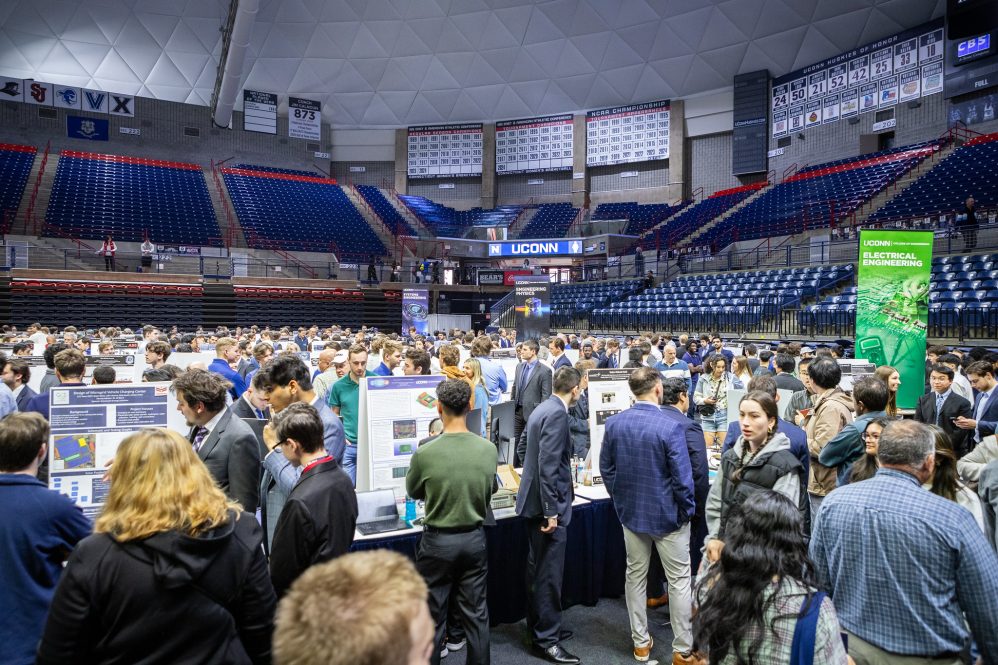
More than 240 teams from the College of Engineering participated in Senior Design Demo Day on April 26. (Chris LaRosa / UConn)
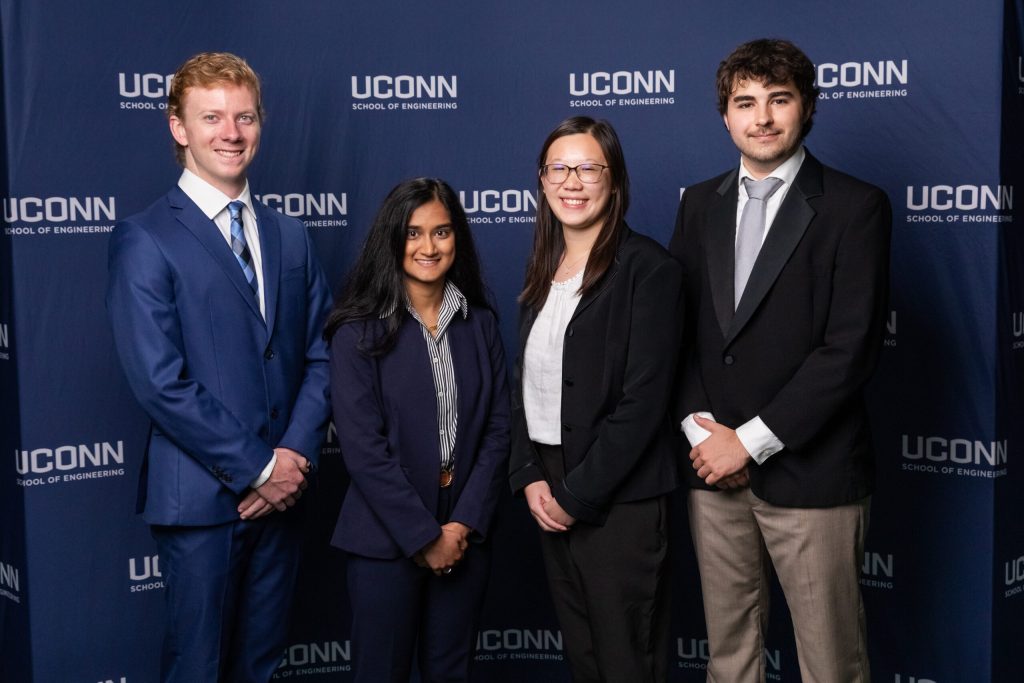
While chemical engineers may more commonly be known for working in areas of pharmaceutical development, materials processing, and petroleum industries, Kanisha Desai ’24 (ENG) is brewing up her own innovative idea for putting her chemical engineering degree to use.
Desai, along with engineering classmates Cameron Hubbard ’24 (ENG), Hailey Tam ’24 (ENG), and Ethan Krouskup ’24 (ENG), debuted their project—a non-alcoholic beer brewing process—during Senior Design Demonstration Day on April 26 in an energy-buzzed Gampel Pavilion. ( View the photo gallery online here .)

“We wanted to solve a problem that most people wouldn’t normally classify as an ‘engineering problem,’” Desai says. “Brewing has always been a fascinating topic to us as chemical engineers, and since many people love the taste and creative flavors of craft beers, but don’t want the added alcohol, this project allows us to help small breweries develop a thriving alcoholic and non-alcoholic beer brewing business.”
The team’s project, “ Spirit of Sobriety: Of Non-Alcoholic Brews ,” was among 242 student-led endeavors showcased during the 2024 Senior Design Demo Day. Sponsored by the College of Engineering (CoE) and under the mentorship of Associate Professor in Residence Jennifer Pascal, the project took first place of all senior designs from the Chemical and Biomolecular Engineering Department.
Senior Design is two-semester capstone course where faculty and industry engineers mentor students as they work to solve real-world engineering problems for university and company sponsors. Through the experience, students learn about the principles of design, how ethics affect engineering decisions, and how professionals communicate ideas. In addition, they acquire valuable teamwork skills and professional skills while interacting with industry professionals and other mentors.
“Each year, dozens of leading manufacturing companies, pharmaceutical and medical firms, consulting practices and utilities present the College of Engineering with design challenges or problems they are encountering in their business,” explains CoE Dean Kazem Kazerounian. “For a modest fee, the companies suggest a particular problem and our senior engineering students, under the joint mentorship of engineering faculty and practicing experts from the sponsoring entities, work to properly frame the problem and develop meaningful solutions.”
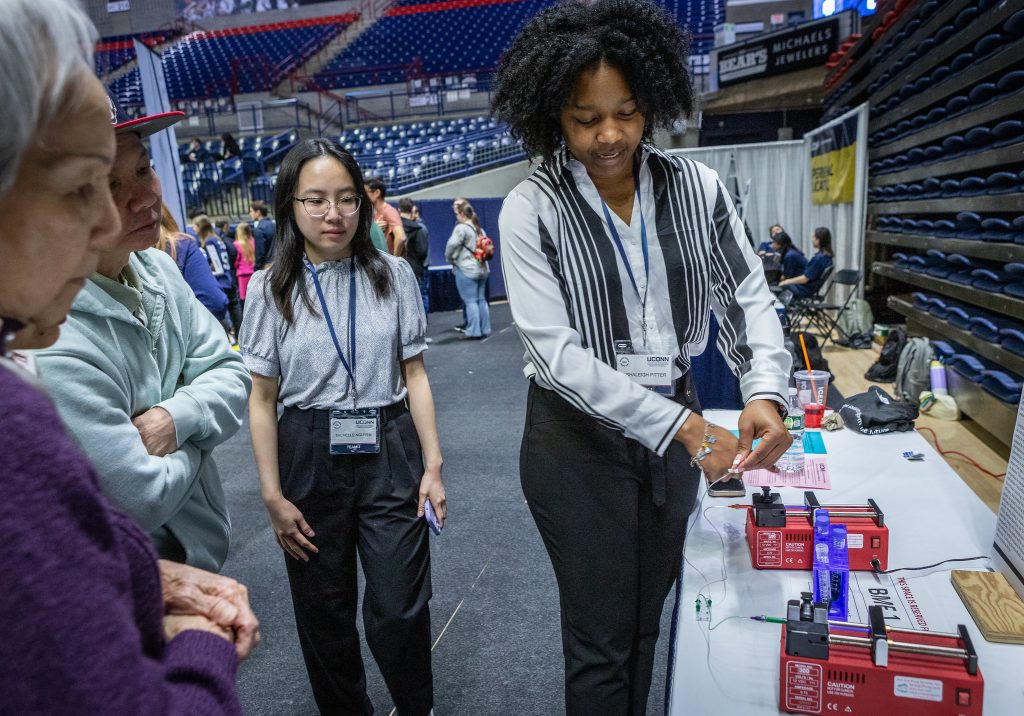
Senior Design Demo Day provides the soon-to-be UConn graduates an opportunity to share the results of their independent research projects with fellow students, faculty, alumni, and community members.
“For our students, this experience is the culmination of their undergraduate education, and an opportunity to showcase their skills and education as they venture into the next steps of their careers,” says Daniel Burkey, associate dean for undergraduate education and Castleman Term Professor in Engineering Innovation. “Even after Demo Day, some students continue working on their project, especially if they accept a job with their project sponsor.”
While the “Spirit of Sobriety” team also implemented a pasteurization process on a home-brewing scale to ensure the safe drinkability of the non-alcoholic beer, materials science and engineering majors Charlotte Chen ’24 (ENG), Sanjana Nistala ’24 (ENG), Jenna Salvatore ’24 (ENG), and Allison Determan ’24 (ENG) designed a “ Joint-On-A-Chip ” to emulate the in vivo environment of a knee joint affected by osteoarthritis. The chip mimics the immune response and mechanical strain that cells in an affected joint experience in the human body.
Through their Senior Design project, “ Deblurring of Digital Images ,” electrical and computer engineering majors Andrew Feliciano ’24 (ENG) and Colby Powers ’24 (ENG) evaluated blur reduction or removal algorithms that could be implemented on imaging systems found on United States Coast Guard ships and naval vessels.
And Gary Zhu’ 24 (ENG), Jack Crocamo ’24 (ENG), Ryka ChandraRaj ’24 (ENG), Alicia Chiu ’24 (ENG), Ryan Mercier ’24 (ENG), and Donny Sauer III ’24 (ENG) completed a systems engineering project titled, “ Data Collection and Analysis for an Autonomous Electric Vehicle System .” With the support of sponsor Pratt & Whitney, the team developed a data analysis framework capable of precisely predicting a self-driving vehicle’s reactions to input directives. The foundation of this initiative rests upon a data-driven control system tailored for electric vehicles, harnessing the power of machine learning algorithms.
Solving Problems Statewide
One of the goals of Senior Design is to help solve problems on a local level.
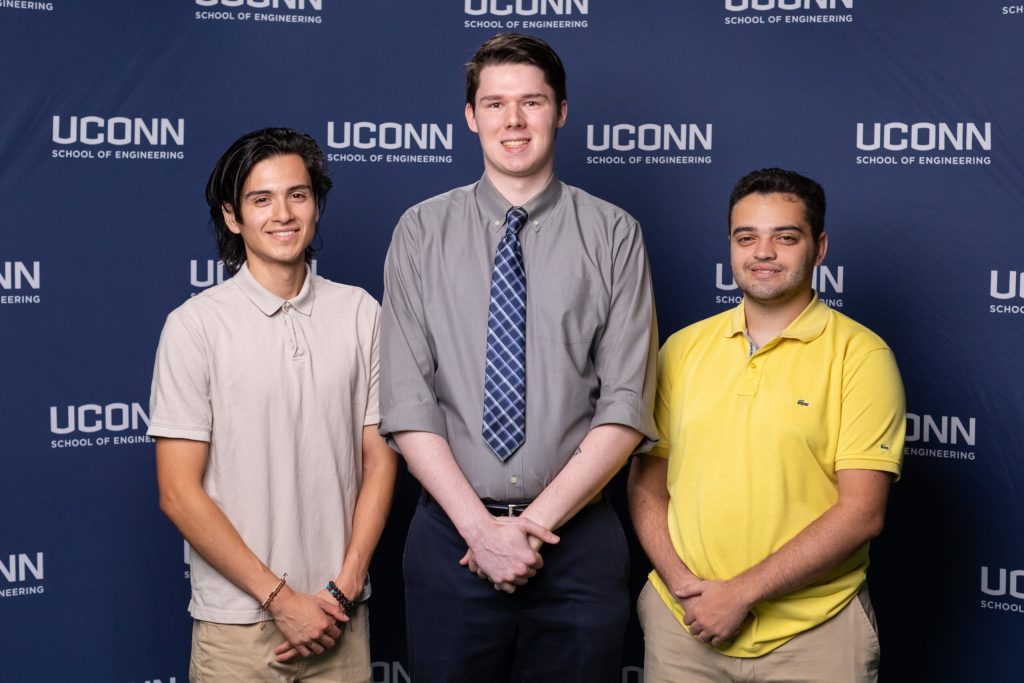
In Madison, Conn., the Connecticut Department of Transportation wants to expand a rest stop along the heavily traveled Interstate 95. Environmental engineering majors Rory Cavicke ’24 (ENG), Kelsey DiCesare ’24 (ENG), and Alexander Brita ’24 (ENG) worked with industry sponsor CHA Consulting to design a septic system and stormwater infrastructure for an expanded tractor trailer rest stop. The team developed their designs in accordance with the CT Public Health Code 2023 Technical Standards and the CT Stormwater Quality Manual.
And in Woodstock, residents are working to restore and preserve the historic Chamberlin Mill, which produced wood shingles in the 19th and early 20th centuries. For their senior design project, mechanical engineering majors Alexander Guzman ’24 (ENG), Will Goss ’24 (ENG), and Vinicius De Souza ’24 (ENG) conducted a mechanical analysis and working CAD model of the mill’s 1860s shingle machine , which will be used by the mill to teach future STEM students.
Catalyzing Campus
Other projects focused on benefiting UConn itself.

Under the guidance of faculty advisor Shinae Jang, civil engineering majors Joshua Maccione ’24 (ENG), Christian Maignan ’24 (ENG), Connor Behuniak ’24 (ENG), Ryan Baj ’24 (ENG), and Darren Lin ’24 (ENG) designed a multi-story, modernized building to accommodate the expanding engineering programs within the newly designated College of Engineering. The team obtained geotechnical data from past construction projects and identified an optimal new location for this proposed facility on campus. The design incorporated composite and non-composite beams, along with a combination of steel and braced frames. Their project, “ Proposed College of Engineering Building at the University of Connecticut ,” took second place of all civil engineering senior designs.
Also, mechanical engineering majors Christian Bjork ’24 (ENG), Alanna Barzola ’24 (ENG), and Nicholas Trottier ’24 (ENG), along with electrical engineering majors Patrick Place ’24 (ENG) and River Granniss ’24 (ENG), collaborated on the design, development, and analysis of a scaled-down, concentrated photovoltaic/thermal system (CPV/T) that could be integrated into a greenhouse roof at UConn. Photovoltaic and thermal systems are considered conventional green energy methods used to power a greenhouse, however combining them is relatively new concept. Because photovoltaic systems can become inefficient when they reach high temperatures, for this project, the team proposed cooling the photovoltaic system with a combined thermal system while simultaneously producing thermal energy to heat the greenhouse.
Their project, “ Design and Development of PV/Thermal System for Greenhouses ” was advised by Wajid Chishty, Nathan Lehman, and Ravi Gorthala and sponsored by Sonalysts, Inc. It received first place in systems engineering projects and third place in mechanical engineering projects.
A Little Competition …
Demo Day isn’t the only venue students share their novel projects. For Senior Design, Ashley Sciacca ’24 (ENG), Nathan Garala ’24 (ENG), Ryan Maguire ’24 (ENG), and Spencer Alsup ’24 (ENG) fabricated a fully electric-powered, waterproof boat . Along with other members of UConn’s Promoting Electric Propulsion team— Christopher Capozzi, Andrews Marsigliano, Ian Pichs, and Xavier Purandah—the group competed in a five-mile course in Virginia, sponsored by the American Society of Naval Engineers. Students designed the boat using a simulation software and combined this data with test results to determine power requirements.
“This was the first year of competition for the UConn team, and of 39 schools, we finished in the top 10, which is a great accomplishment,” said project advisor Vito Moreno, professor in residence of mechanical engineering.
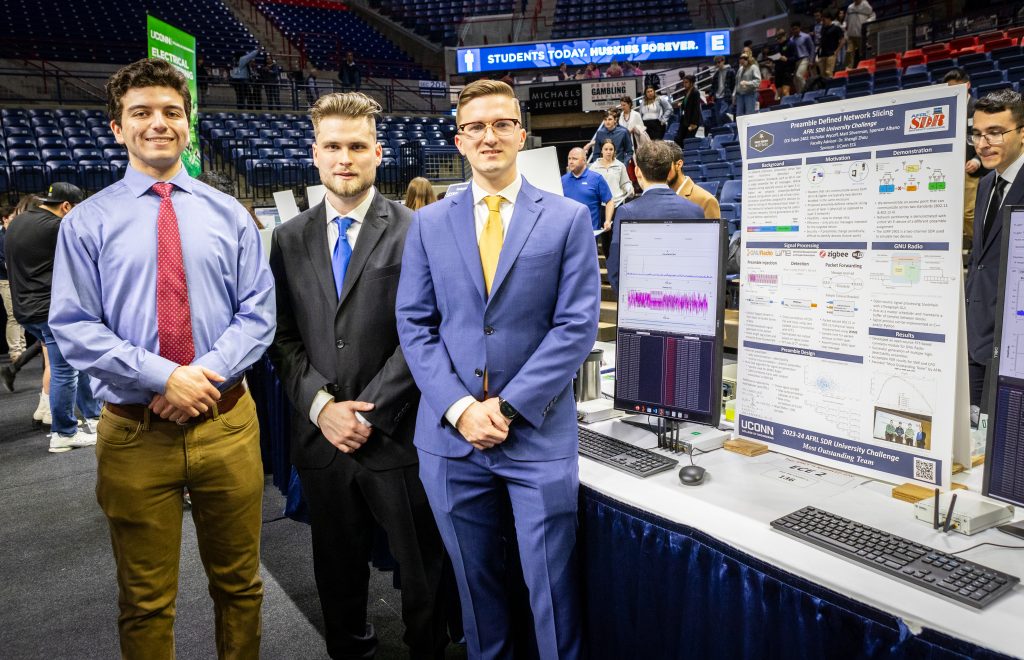
Similarly, electrical and computer engineering majors Matthew Silverman ’24 (ENG), Spencer Albano ’24 (ENG), and Nicholas Wycoff ’24 (ENG) participated in a Software Defined Radio (SDR) university challenge in Ohio with their Senior Design project, “ Physical Layer Network Slicing .” They created an access point that can establish a network and communicate across both Wi-Fi and Zigbee (a Wi-Fi alternative) devices. The competition, hosted by the Wright Brothers Institute (WBI) and Air Force Research Laboratory, encouraged hands-on skill building and explore experimentation through SDR hardware. UConn’s team was among the top 8 finalists and received the Most Outstanding Project Award. Shengli Zhou, professor of electrical and computer engineering, served as the team’s advisor.
“There are some routers that can communicate over both Wi-Fi and Zigbee but are typically two separate devices bundled in the same enclosure,” Albano explains. “Having one device that communicates across both standards provides ease to a network administrator that can manage devices in both standards. The benefits include efficiency, flexibility, and security.”
And the Winners Are …
Senior Design Demo Day began more than 40 years ago. Today, it features the projects of students majoring in biomedical engineering, chemical and biomolecular engineering; civil and environmental engineering; electrical and computer engineering; environmental engineering; materials science and engineering; systems engineering; management and engineering manufacturing; multidisciplinary engineering; the School of Computing; and the School of Mechanical, Aerospace, and Manufacturing Engineering.
Each CoE department and school awarded prizes for the best poster presentations. The 2024 winners are:
Biomedical Engineering
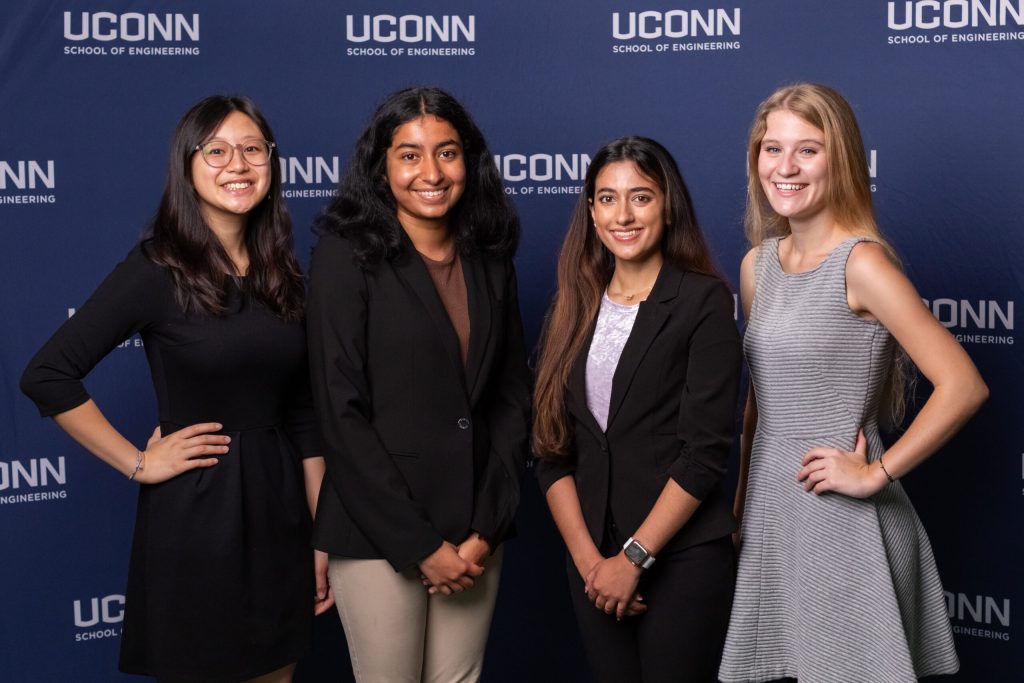
1st place: “Joint-On-A-Chip Osteoarthritis Disease Modeling for Evaluating Anti-Inflammatory Drug Performance,” by Charlotte Chen (MSE), Sanjana Nistala, Jenna Salvatore, and Allison Determan. Advisor: Syam Nukavarapu. Sponsor: UConn Biomedical Engineering Department.
2nd place: Singular Part 3D-Printed External Prosthetics for Mastectomy Patients Without Reconstruction,” by Yukti Ummaneni, Ashwini Patel, Mia Haynes, and Jamie Trinh. Advisor: Liisa Kuhn. Sponsor: Beekley Lab for Biosymmetrix
3rd place (tie): “Circuit and Sensor Design for Smartphone-Based Electroretinography,” by Rory Harris, Rodrigo Tuesta, and Yuexi Hao. Advisor: Hugo Posada-Quintero. Sponsor: UConn Biomedical Engineering Department.
3rd place (tie): “In Vitro Model for the Study of Traumatic Brain Injury” by Mark Cristino, Rudin Lloga, and Kaiya Pringle. Advisor: Kazunori Hoshino. Sponsor: UConn Biomedical Engineering Department.
Chemical and Biomolecular Engineering 1st place: “Spirit of Sobriety: Of Non-Alcoholic Brews,” by Cameron Hubbard, Kanisha Desai, Hailey Tam, and Ethan Krouskup. Advisor: Jennifer Pascal. Sponsor: UConn College of Engineering.
2nd place: “Design And Optimization Of A Multi-Effect Desalination Unit Integrated With A Gas Turbine Plan,” by Wasif Zaman, Katelyn Honegger, Alanna Smith, and David Gan. Advisor: Burcu Beykal. Sponsor: UConn College of Engineering.
3rd place: “Redefining How to Process Body Wash: Creating A More Efficient and Agile Supply Chain,” by Aadil Shahzad, Samantha Miel, Megan Shiring, and Matthew Silver. Advisor: Anson Ma. Sponsor: Unilever.
Civil Engineering 1st place: “Blue Line Extension,” by Anson Lau, Yuanlong Dai, Helen Pruchniak, Nicholas Vestergaard. Advisor: Wei Zhang. Sponsor: Construction Industries of Massachusetts-Labor Relations Division (CIM-LRD).
2nd place: “Proposed College of Engineering Building at the University of Connecticut,” by Joshua Maccione, Christian Maignan, Connor Behuniak, Ryan Baj, and Darren Lin. Advisor: Shinae Jang. Sponsor: Slam Collaborative.
3rd place (tie): “Design of Pedestrian Walkway For The Gold Star Memorial,” by Shaun McGuire, Kayla Turner, Steven Anderson, Juan Javier Mejia. Advisor: Manish Roy. Sponsor: HNTB Corporation.
3rd place (tie): “Worcester Union Station Center Island Platform Project,” by Conor Murphy, Harley Jeanty, Jakub Patrosz, Benjamin Ragozzine. Advisor: Wei Zhang. Sponsor: HDR, Inc.
Environmental Engineering
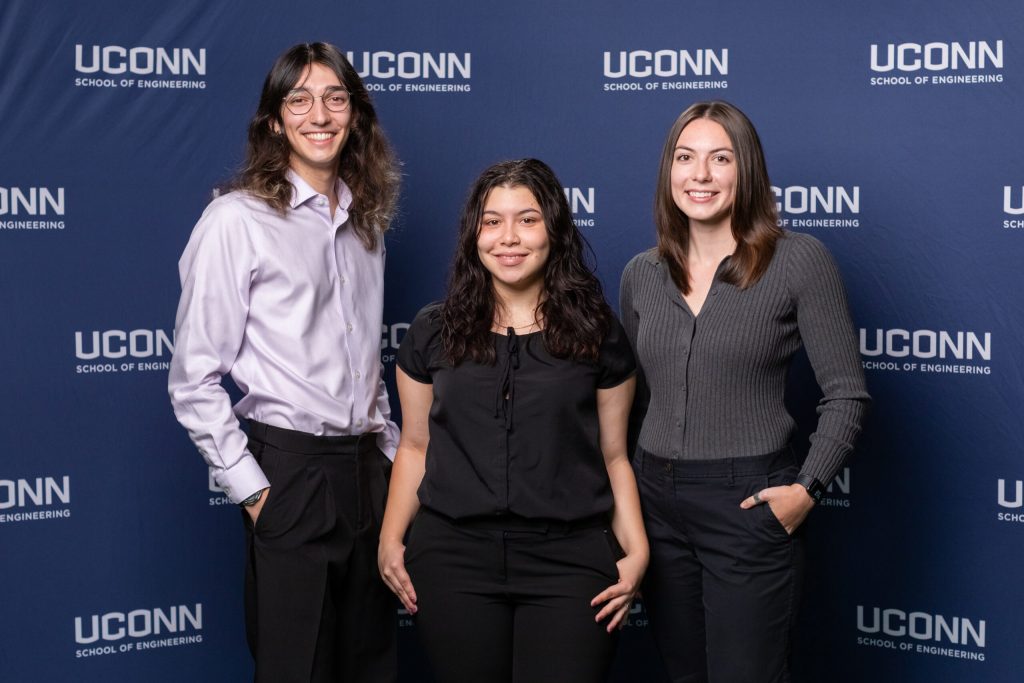
1st place: “Remedial Design of a PFAS Contaminated Site in Connecticut,” by Valentine Falsetta, Wilmalis Rodriguez, and Nicola Bacon. Advisor: Alexander Agrios. Sponsor: Amine Dahmani.
2nd place: “Stormwater/Septic Design,” by Rory Cavicke, Kelsey DiCesare, and Alexander Brita. Advisor: Alexander Agrios. Sponsor: CHA Consulting, Inc.
3rd place: “Stones Ranch Road Drainage Upgrades and Erosion Control,” by Grace Carravone, Amanda Jacobson, Sara Makula, and Jason Contreras. Advisor: Manish Roy. Sponsor: Connecticut National Guard.
School of Computing 1st place: “Solubility Data Management,” by John Bogacz, Connor Brush, Maniza Shaikh, Jianhua Zhu, Walson Li, and Peter Filip. Advisor: Qian Yang. Sponsor: Boehringer Ingelheim.
2nd place: “Light Scattering Automation,” by Zachary Hall, Nikolas Anagnostou, Alden Dus, Jacob Montanez, Avaneesh Sathish, Zakarya Zahhal, and Nikolas Kallicharan. Advisor: Qian Yang. Sponsor: UConn School of Computing.
3rd place: “Responsive Multimodal Care Coordinator (MCC) Development,” by Randy Yu, James Frederick, Betul Agirman, Cameron Ky, Quincy Miller, and Mir Zaman. Advisor: Suining He. Sponsor: University of Connecticut and Bastion.
Electrical and Computer Engineering Projects 1st place: “Robotic Perception Sensor Characterization Platform,” by Hritish Bhargava and Samuel Gresh. Advisor: Shan Zuo. Sponsor: Draper Laboratory.
2nd place: “Air Force Research Laboratory Software Defined Radio (SDR) University Challenge: Physical Layer Network Slicing,” by Spencer Albano, Matthew Silverman, and Nicholas Wycoff Advisor: Shengli Zhou. Sponsor: UConn Electrical and Computer Engineering Department.
3rd place: “Automated Angle Table for AS5,” by Alexander ReCouper and Mitchell Bronson. Advisor: Liang Zhang. Sponsor: OEM Controls.
Materials Science and Engineering 1st place and Student Choice Award (tie): “Joint-On-A-Chip Osteoarthritis Disease Modeling for Evaluating Anti-Inflammatory Drug Performance,” by Charlotte Chen, Sanjana Nistala, Jenna Salvatore, and Allison Determan. Advisor: Fiona Leek. Sponsor: UConn Biomedical Engineering Department.
2nd place and Student Choice Award (tie): “Citric Acid Passivation Process Development,” by Kevin Li and Matthew Maramo. Advisor: Alexander Dupuy. Sponsor: ARKA.
3rd place: “Bio-Based Material Commercial Door Components Footprint,” by Yuexuan Gu and Jaclyn Grace. Advisor: Fiona Leek. Sponsor: ASSA ABLOY.
Management and Engineering for Manufacturing 1st place: “Enhancing Smartfood Popcorn Line Efficiency to Reduce Downtime And Boost Production Performance,” by Anna Lidsky, Valeria Nieto, Isabelle Bunosso, and Lauren Hart. Advisor: Craig Calvert. Sponsor: PepsiCo Frito-Lay.
2nd place: “Modernizing Raw Material Marking and Inventory System To Enhance Traceability,” by Nimai Browning, Quinn Reelitz, Steven Jaret, and Austin Muzzy. Advisors: Craig Calvert and Rajiv Naik. Sponsor: HORST Engineering.
3rd place: “Reliability Testing and Design Risk Assessment to Enhance Product Quality and Business Sustainability,” by Alex Domingo, Madeline Corbett, Brett Pierce, and Alexander Pearl. Advisor: Rajiv Naik. Sponsor: Belimo Americas.
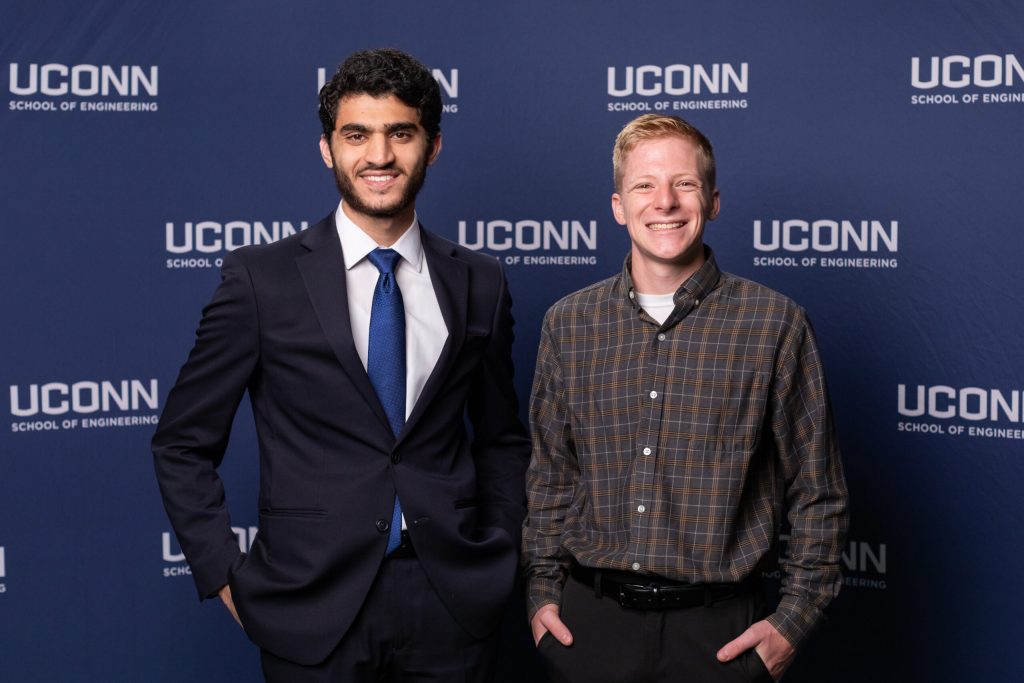
School of Mechanical, Aerospace, and Manufacturing Engineering Professors Award: “Designing and Operating An Experimental Facility To Study Non-Premixed Flames Of Pre-Heated (And Pre-Vaporized) Reactants,” by Al-Yaman Zoghol and Tyler Dickey. Advisor: Francesco Carbone. Sponsor: UConn College of Engineering.
1st place: “Multifunctional Metamaterial to Attenuate Acoustic and Elastic Waves,” by Evan Kluge and Lindsey Japa. Advisor: Osama Bilal. Sponsor: ACC Masters.
2nd place (tie): “Improved Performance of Magnetic Speed Sensor Analyzer,” by Kristen Angeli and Emily Root. Advisor: Farhad Imani. Sponsor: AI-Tek Instruments.
2nd place (tie): “Belt Based Continuously Variable Automatic Transmission Prototype,” by Ajeeth Vellore, Luka Ligouri, Ethan Wicko, and Ryan Zwick. Advisor: David Pierce. Sponsor: Transcend Bicycle LLC.
3rd place: “Design and Development of PV/Thermal System for Greenhouses,” by Christian Bjork, Alanna Barzola, Nicholas Trottier, Patrick Place and River Granniss. Advisors: Wajid Chishty, Nathan Lehman, and Ravi Gorthala. Sponsor: Sonalysts, Inc.
Systems Engineering 1st place (tie): “Robotic Perception Sensor Characterization Platform,” by Isabella Fabrizi, Liam Mohan, Samuel Gresh, Aveline Mills, Gerardo Robles-Luna, and Hritish Bhargava. Advisor: Osama Bilal. Sponsor: Draper.
1st place (tie): “Design and Development of PV/Thermal System for Greenhouses,” by Christian Bjork, Alanna Barzola, Nicholas Trottier, Patrick Place and River Granniss. Advisors: Wajid Chishty, Nathan Lehman, and Ravi Gorthala. Sponsor: Sonalysts, Inc.
Multidisciplinary Engineering In addition to the Demo Day awards, six seniors were honored for being among UConn’s first multidisciplinary engineering majors: Edward Wilkinson, Matthew Koniecko, Sean Tan, Patricio Salomon-Mir, Josephine Luby, and Kelly Russell.
Distinguished Educator Engineering Award (nominated by students) Jasna Jankovic, associate professor of materials science and engineering, and Manish Roy, assistant professor in residence of civil and environmental engineering.
Recent Articles
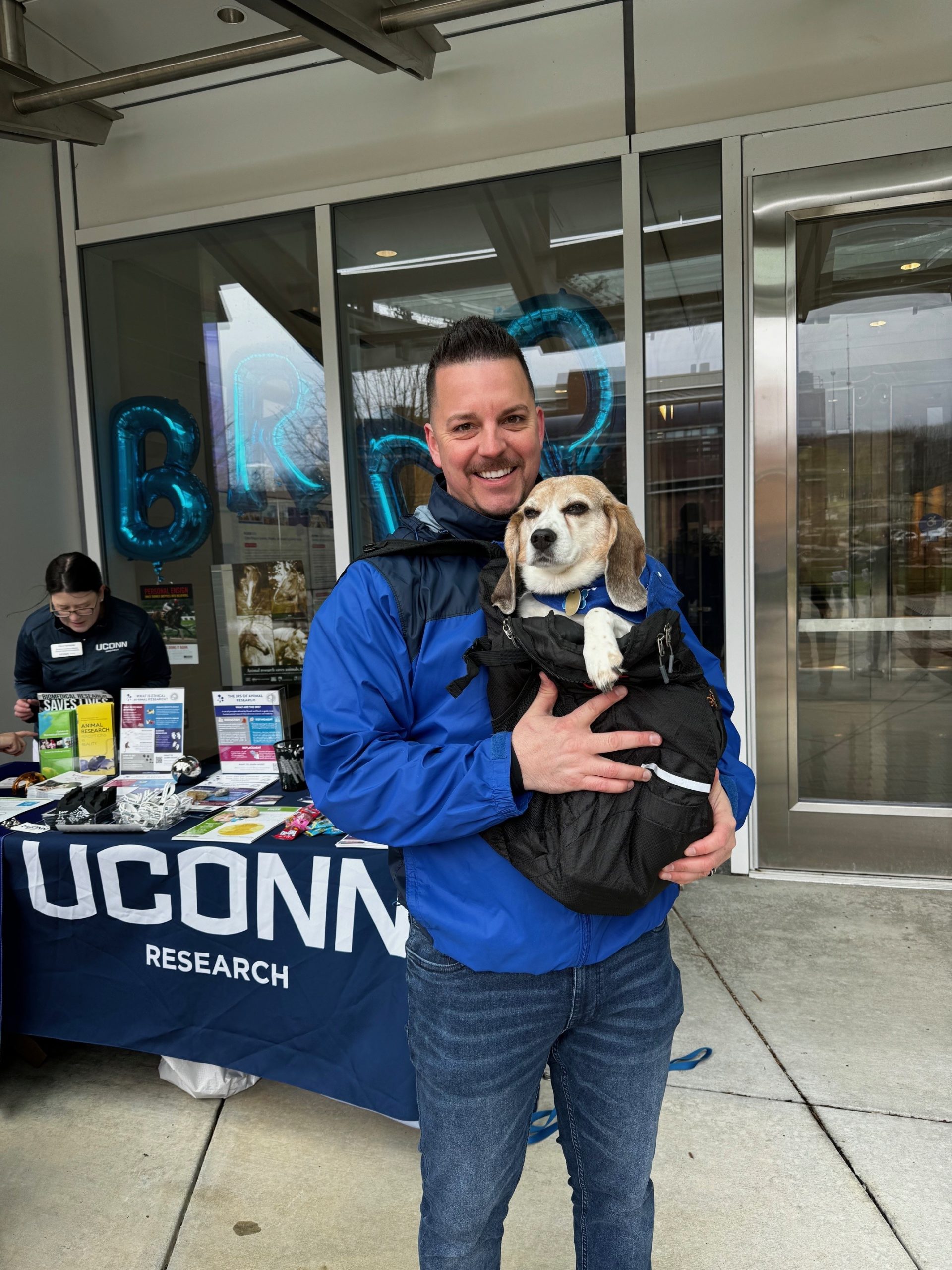
May 1, 2024
UConn Staff Raises Awareness for Humane Biomedical Research
Read the article

Researchers Explore Non-Surgical Approaches to Treat TMD Pain, Free Treatment Available
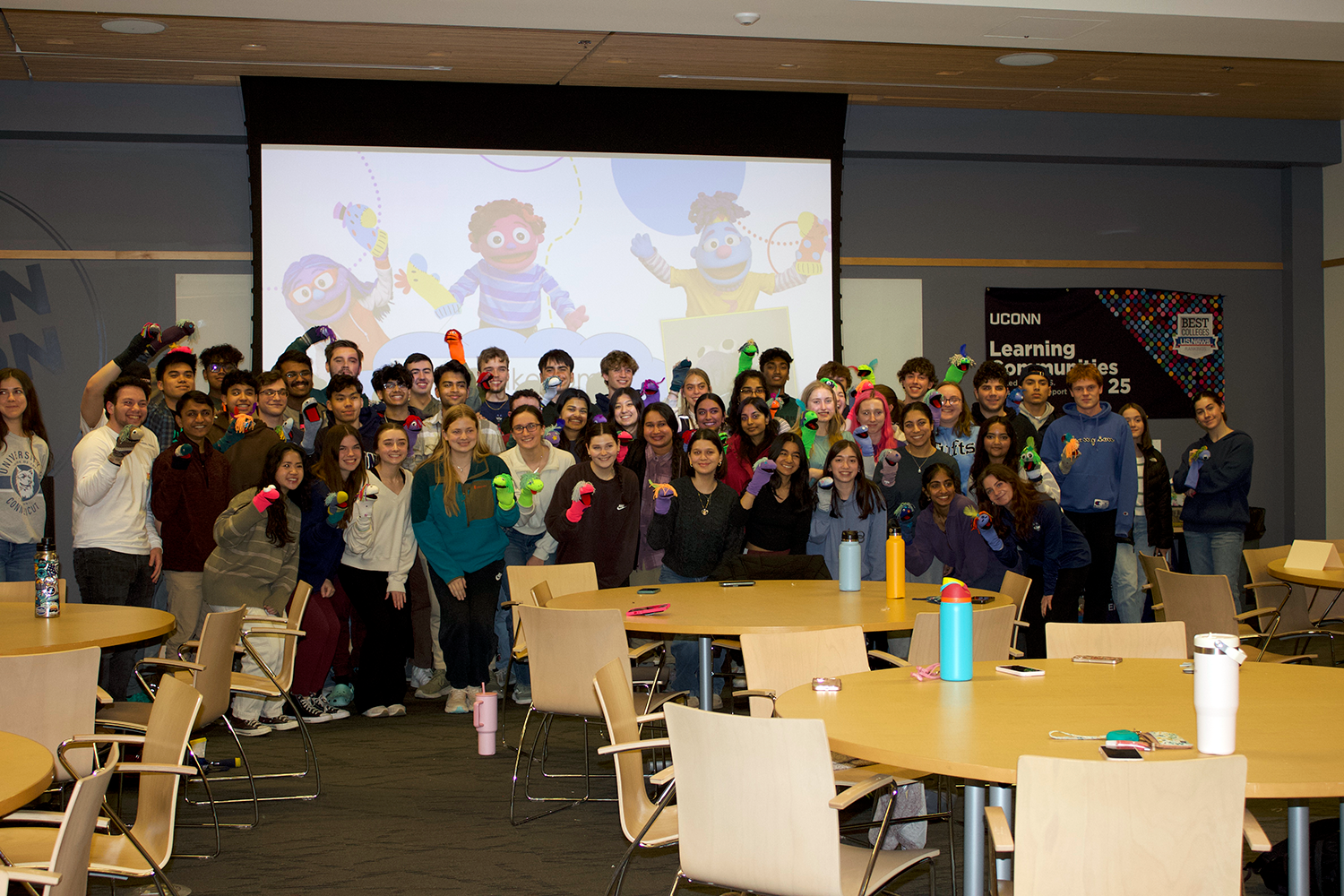
Students From Public Health House Learning Community Feel Their Best Self
Suggestions or feedback?
MIT News | Massachusetts Institute of Technology
- Machine learning
- Social justice
- Black holes
- Classes and programs
Departments
- Aeronautics and Astronautics
- Brain and Cognitive Sciences
- Architecture
- Political Science
- Mechanical Engineering
Centers, Labs, & Programs
- Abdul Latif Jameel Poverty Action Lab (J-PAL)
- Picower Institute for Learning and Memory
- Lincoln Laboratory
- School of Architecture + Planning
- School of Engineering
- School of Humanities, Arts, and Social Sciences
- Sloan School of Management
- School of Science
- MIT Schwarzman College of Computing
Science communication competition brings research into the real world
Press contact :.
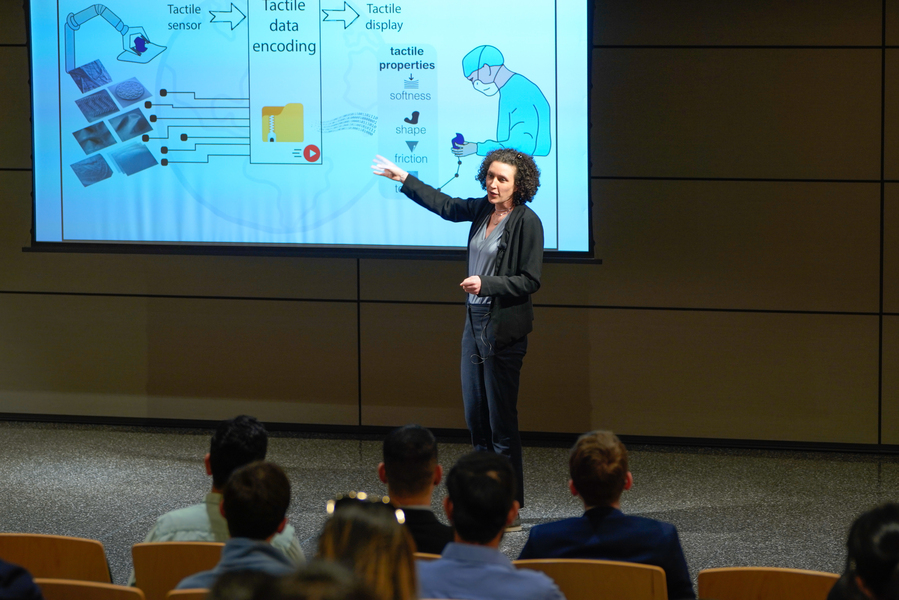
Previous image Next image
Laurence Willemet remembers countless family dinners where curious faces turned to her with shades of the same question: “What is it, exactly, that you do with robots?”
It’s a familiar scenario for MIT students exploring topics outside of their family’s scope of knowledge — distilling complex concepts without slides or jargon, plumbing the depths with nothing but lay terms. “It was during these moments,” Willemet says, “that I realized the importance of clear communication and the power of storytelling.”
Participating in the MIT Research Slam, then, felt like one of her family dinners.
The finalists in the 2024 MIT Research Slam competition met head-to-head on Wednesday, April 17 at a live, in-person showcase event. Four PhD candidates and four postdoc finalists demonstrated their topic mastery and storytelling skills by conveying complex ideas in only 180 seconds to an educated audience unfamiliar with the field or project at hand.
The Research Slam follows the format of the 3-Minute Thesis competition, which takes place annually at over 200 universities around the world. Both an exciting competition and a rigorous professional development training opportunity, the event serves an opportunity to learn for everyone involved.
One of this year’s competitors, Bhavish Dinakar, explains it this way: “Participating in the Research Slam was a fantastic opportunity to bring my research from the lab into the real world. In addition to being a helpful exercise in public speaking and communication, the three-minute time limit forces us to learn the art of distilling years of detailed experiments into a digestible story that non-experts can understand.”
Leading up to the event, participants joined training workshops on pitch content and delivery, and had the opportunity to work one-on-one with educators from the Writing and Communication Center, English Language Studies, Career Advising and Professional Development, and the Engineering Communication Labs, all of which co-sponsored and co-produced the event. This interdepartmental team offered support for the full arc of the competition, from early story development to one-on-one practice sessions.
The showcase was jovially emceed by Eric Grunwald, director of English language learning. He shared his thoughts on the night: “I was thrilled with the enthusiasm and skill shown by all the presenters in sharing their work in this context. I was also delighted by the crowd’s enthusiasm and their many insightful questions. All in all, another very successful slam.”
A panel of accomplished judges with distinct perspectives on research communication gave feedback after each of the talks: Deborah Blum, director of the Knight Science Journalism Program at MIT; Denzil Streete, senior associate dean and director of graduate education; and Emma Yee, scientific editor at the journal Cell .
Deborah Blum aptly summed up her experience: “It was a pleasure as a science journalist to be a judge and to listen to this smart group of MIT grad students and postdocs explain their research with such style, humor, and intelligence. It was a reminder of the importance the university places on the value of scientists who communicate. And this matters. We need more scientists who can explain their work clearly, explain science to the public, and help us build a science-literate world.”
After all the talks, the judges provided constructive and substantive feedback for the contestants. It was a close competition, but in the end, Bhavish Dinakar was the judges’ choice for first place, and the audience agreed, awarding him the Audience Choice award. Omar Rutledge’s strong performance earned him the runner-up position. Among the postdoc competitors, Laurence Willemet won first place and Audience Choice, with Most Kaniz Moriam earning the runner-up award.
Postdoc Kaniz Mariam noted that she felt privileged to participate in the showcase. “This experience has enhanced my ability to communicate research effectively and boosted my confidence in sharing my work with a broader audience. I am eager to apply the lessons learned from this enriching experience to future endeavors and continue contributing to MIT's dynamic research community. The MIT Research Slam Showcase wasn't just about winning; it was about the thrill of sharing knowledge and inspiring others. Special thanks to Chris Featherman and Elena Kallestinova from the MIT Communication Lab for their guidance in practical communication skills. ”
Double winner Laurence Willemet related the competition to experiences in her daily life. Her interest in the Research Slam was rooted in countless family dinners filled with curiosity. “‘What is it exactly that you do with robots?’ they would ask, prompting me to unravel the complexities of my research in layman’s terms. Each time, I found myself grappling with the task of distilling intricate concepts into digestible nuggets of information, relying solely on words to convey the depth of my work. It was during these moments, stripped of slides and scientific jargon, that I realized the importance of clear communication and the power of storytelling. And so, when the opportunity arose to participate in the Research Slam, it felt akin to one of those family dinners for me.”
The first place finishers received a $600 cash prize, while the runners-up and audience choice winners each received $300.
Last year’s winner in the PhD category, Neha Bokil, candidate in biology working on her dissertation in the lab of David Page, is set to represent MIT at the Three Minute Thesis Northeast Regional Competition later this month, which is organized by the Northeastern Association of Graduate Schools.
A full list of slam finalists and the titles of their talks is below.
PhD Contestants:
- Pradeep Natarajan, Chemical Engineering (ChemE), “What can coffee-brewing teach us about brain disease?”
- Omar Rutledge, Brain and Cognitive Sciences, “Investigating the effects of cannabidiol (CBD) on social anxiety disorder”
- Bhavish Dinakar, ChemE, “A boost from batteries: making chemical reactions faster”
- Sydney Dolan, Aeronautics and Astronautics, “Creating traffic signals for space”
Postdocs:
- Augusto Gandia, Architecture and Planning, “Cyber modeling — computational morphogenesis via ‘smart’ models”
- Laurence Willemet, Computer Science and Artificial Intelligence Laboratory, “Remote touch for teleoperation”
- Most Kaniz Moriam, Mechanical Engineering, “Improving recyclability of cellulose-based textile wastes”
- Mohammed Aatif Shahab, ChemE, “Eye-based human engineering for enhanced industrial safety”
Research Slam organizers included Diana Chien, director of MIT School of Engineering Communication Lab ; Elena Kallestinova, director of MIT Writing and Communication Center ; Alexis Boyer, assistant director, Graduate Career Services, Career Advising and Professional Development (CAPD); Amanda Cornwall, associate director, Graduate Student Professional Development, CAPD; and Eric Grunwald, director of English Language Studies. This event was sponsored by the Office of Graduate Education, the Office of Postdoctoral Services, the Writing and Communication Center, MIT Career Advising and Professional Development , English Language Studies, and the MIT School of Engineering Communication Labs.
Share this news article on:
Related links.
- MIT Research Slam
- Research Slam YouTube channel
- MIT Career Advising and Professional Development (CAPD)
- Graduate Student Professional Development
- Writing and Communication Center
- MIT School of Engineering Communication Lab
- MIT English Language Studies
Related Topics
- Contests and academic competitions
- Science communications
- Graduate, postdoctoral
- Technology and society
- Science writing
- Career Advising and Professional Development
Related Articles
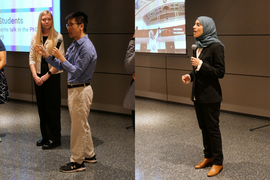
Third annual MIT Research Slam showcase highlights PhD and postdoc communication skills
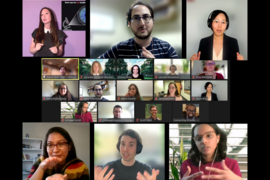
MIT Research Slam showcases postdoc and PhD communication skills
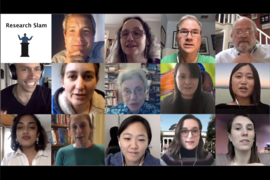
Third annual Science Slam becomes first virtual Research Slam
Previous item Next item
More MIT News
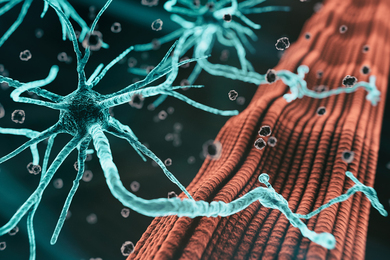
Epigenomic analysis sheds light on risk factors for ALS
Read full story →
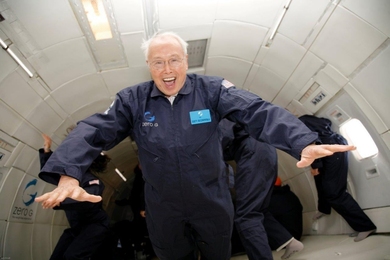
Francis Fan Lee, former professor and interdisciplinary speech processing inventor, dies
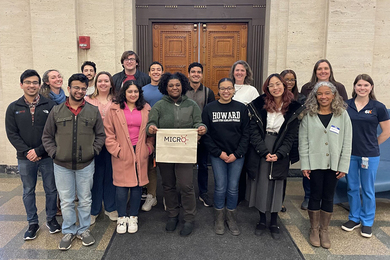
Fostering research, careers, and community in materials science
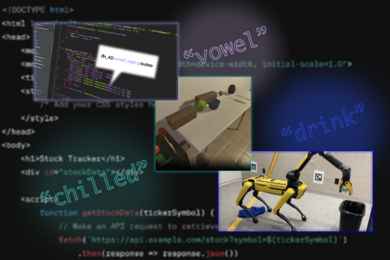
Natural language boosts LLM performance in coding, planning, and robotics

Nuno Loureiro named director of MIT’s Plasma Science and Fusion Center

Studies in empathy and analytics
- More news on MIT News homepage →
Massachusetts Institute of Technology 77 Massachusetts Avenue, Cambridge, MA, USA
- Map (opens in new window)
- Events (opens in new window)
- People (opens in new window)
- Careers (opens in new window)
- Accessibility
- Social Media Hub
- MIT on Facebook
- MIT on YouTube
- MIT on Instagram

IMAGES
VIDEO
COMMENTS
How ATL research skills can be developed throughout a unit of inquiry. Fourth-grade students were inquiring about children's rights worldwide. The teachers identified research skills as a tool that would provide students with a lens on factors that impact children's rights worldwide.
Outputs of the project. A summary document Approaches to teaching and learning in the Diploma Programme. 26 short (5 minute) videos. Unit planner and examples of completed unit plans. 6 interviews with experts in the field, e.g. Grant Wiggins. 12 mini 2 page "case studies" of pilot school initiatives. A "self reflection tool" for teachers.
Research Skills: Information-literacy skills (Formulating and planning, data gathering and recording, ... This set of five ATL skills playbooks, produced by Toddle, is designed to help you target specific skill indicators in your teaching and learning processes. The playbooks collate exciting ideas for skill-based activities that can be aligned ...
For example, The OECD Learning Compass 2030 distinguishes between three different types of skills: cognitive and metacognitive skills which include critical thinking, creative thinking, learning-to-learn and self-regulation (PYP ATL Thinking & Research Skills); social and emotional skills - which include empathy, self-efficacy, responsibility ...
experiences, so that students have opportunities to practice and incrementally develop a range of ATL skills. This report summarizes the findings from the research study by the Claremont Evaluation Centre (CEC) on implementation of ATL as part of the collaborative strategies. What does MYP ATLs implementation look like across the world?
ATL skills are often interconnected. Individual skills and skills clusters frequently overlap and may be relevant to more than one skill category. Some of the key questions to be answered by students with respect to ATL skills include the following. • What are my present skills in this area and what evidence do I have of my development?
Self-assessment using a flowchart. This flowchart allows students to understand the process of assessing ATL skills. It helps them organize and structure their insights and they can share the results with the whole class to overcome obstacles. The flowchart fosters the curiosity and interest of students by inspiring them to be better in each ...
This outlines the ATL skills needed to complete a task. During the MYP we will need to explore each of these skills and teach in the context of planning and assessing assignments, however when a student is completing the DP these need not be explicitly taught, however the skills should be there as an underlying checklist, especially with a
One of the skills is Research skills and this connects with the subject I teach - Information Literacy. ... The exemplars are good reference for teachers and librarians for collaboration on multiple aspect of research along with ATL skills. Appreciate Ms. Lamiya sharing her absolutely empirical experience and best practice. Thanks for a very ...
There is a system for the regular review of individual unit plans and of the planning of approaches to learning skills. (C2.1f) Collaborative planning and reflection addresses vertical and horizontal articulation. (C1.3) From Principles into Practice: Leadership should. ensure that teachers understand ATL skills and their role in the programme.
8-9 year-olds Respecting others: Consistently shows respect by listening to others, valuing and accepting points of view and different opinions. Is aware of the need to listen to others. Is beginning to identify fairness and equality in situations independently. Recognizes that there are differences in belief, points of view, and ideas.
The focus of approaches to learning in the MYP is on helping students to develop the self-knowledge and skills they need to enjoy a lifetime of learning. ATL skills empower students to succeed in meeting the challenging objectives of MYP subject groups and prepare them for further success in rigorous academic programmes like the IB Diploma ...
ATL Skill Category: Research Skills in Cluster Grade 5 Grade 6 Grade 7 Grade 8 How can students demonstrate information Literacy? Finding, interpreting, judging and creating information Collect, record, verify, analyse and interpret data Access information to be informed and inform others Make connections between various sources of information ...
ATL skills help students prepare themselves and demonstrate learning through meaningful learning. In conclusion, ATL skills focus on the learning process, helping students to be confident, independent, and ... Ten ATL skills cluster framework 2. RESEARCH METHOD In line with the objectives of this research which aims to understand, the ...
Integration of ATL's in Unit Planners at the exemplary (sharing) level: *Are specifically identified and integrate meaningfully with engagements and assessment tasks. *Offer students opportunities to develop responsibility for their own learning through independent practice. *Include clear descriptions of how skills are explicitly taught and specific strategies are practiced.
These ATL skills are related t o the dev elopment of thinking skills, strategies, an d attitudes as well as the ability to reflect o n self-learning. ATL skills are divided into five categories ...
intention that these ATL skills should be seen as linking closely with the attitudes and dispositions identified in the IB learner profile. The learner profile is the IB mission statement translated into a set of learning outcomes ... Research skills . Thinking skills Concern with developing students' thinking, far from being a fad, is one of ...
Girls, Boys, and Media: A Gender and Digital Life Toolkit for Schools. Commonsense Media Education provides a series of lessons to help students navigate challenging issues in social media. Lessons are divided into primary, middle and senior, with supporting materials including films and worksheets.
Research skills provide the the ability to search for information about a topic, evaluate that information efficiently, and share findings in an organized way.. For each skill category and cluster, IB provides skill indicators which learners can develop and demonstrate. Links to helpful resources and further ideas related to specific skill indicators are provided here.
ATL skills explicit in Research, Self-Management, Communication, Thinking, Social in relation to specific, relevant tasks that students must complete value-added with! CAS check-ins ! Specific EE supports for all students with blocked time in their schedule, a support teacher to guide them in the research
ATL: Research skills. Information literacy skills. How can studentsdemonstrate informationliteracy? Finding, interpreting, judging and creating information. Collect, record and verify data. Access information to be informed and inform others. Make connections between various sources of information. Understand the benefits and limitations of ...
The ATL skills that are emphasized in the IB curriculum include self-management, research, communication, and thinking skills. These skills are designed to help students become independent learners who are capable of managing their time, resources, and emotions effectively. Additionally, these skills allow students to effectively navigate and ...
Develop Research skills| ATL. According to Marcus Aurelius-. "Research is the ability to investigate systematically and truly all that comes under your observation in life". Research - The word itself signifies Re- Repeat Search - Your finding. Research skill is a skill of finding reliable information, organizing it and understanding ...
Transferable skills, also known as portable skills, are those versatile abilities that you can bring to any role or industry—which is particularly helpful when changing careers.But you don't need to be an expert to have them; these valuable skills can be acquired from all sorts of experiences, like past jobs, volunteering, internships, college, or personal projects.
April 29, 2024. St. John's University students showed off their research skills April 9-10 during the University's annual Student Research Conference, which welcomed work from students in several Schools and Colleges and assorted academic fields.. From Communication Studies to Pharmaceutical Sciences, Library and Information Science, and more, undergraduate and graduate student projects ...
Westfield Technical Academy will be sponsoring a student in the national SkillsUSA competition in Atlanta in June. ... to Marlborough for the three-day State Leadership and Skills Conference on ...
In addition, they acquire valuable teamwork skills and professional skills while interacting with industry professionals and other mentors. "Each year, dozens of leading manufacturing companies, pharmaceutical and medical firms, consulting practices and utilities present the College of Engineering with design challenges or problems they are ...
These regular sessions, which take PhD students and other researchers through key academic research skills, kick off on 24 April and run through until 6 June. 25 March 2024 Cambridge University Libraries Research Skills (CULRS) sessions have gone live for Easter term 2023-24. These regular sessions, which take PhD students and other researchers ...
The 4th annual Research Slam featured three-minute talks on cutting-edge research from PhD students and postdocs competing for cash prizes as they ... Four PhD candidates and four postdoc finalists demonstrated their topic mastery and storytelling skills by conveying complex ideas in only 180 seconds to an educated audience unfamiliar with the ...